Local listing management is like making sure your business can be found on a giant online map. It's about giving your business a digital ID card that tells people:
- Who you are (your business name)
- Where you are (your address)
- How to reach you (your phone number and website)
This information shows up in many places online—like Google, Yelp, and smartphone maps.
Why Do Accurate Listings Matter?
If your friend gives you the wrong address for a party. You’d be lost, right?
It’s the same for your business. Customers can’t find you if online maps and directories have the wrong info. That’s why your business details need to be accurate everywhere on the internet.
There are four key providers: Neustar Localeze, Factual, and Acxiom. They collect your business details and share that data with websites and apps all over the internet.
Websites like Google and Bing, review applications like Yelp and Foursquare, and social media sites like Instagram or Facebook all pull information from these key providers.
Why Should You Care?
Most people seek out business information online. Yelp alone has over 80 million visitors every month. There’s also TripAdvisor and Google Business Profiles, where people are searching for online businesses.
If someone finds the wrong info, they might give up looking altogether. Studies show that 62% of people would avoid using a business if they found incorrect information online.
This is why accurate listings are super important for local businesses.
They’re the breadcrumbs that lead customers right to your doorstep. With good local listing management, when someone types “best cupcakes near me” or “bookstore in [your city],” they’ll find you, not a dead end.
Ever wonder how some businesses seem to pop up everywhere online?
They’re using something called a local listing management tool. It’s a piece of software that helps a business shine in the crowded online marketplace.
These tools make updating and synchronizing business details, like address and opening hours, a breeze across multiple online platforms.
That means your business shows up with the right info—whether your customers are:
- Searching on Google
- Scrolling through Yelp
- Asking Siri for suggestions
This builds trust with your customers and makes sure your business is easy to find—a big plus for driving foot traffic your way.
This article first explores how the Semrush Listing Management tool can help you stay ahead of competitors. Then, we’ll explore eight of the best alternatives to help you manage your online presence effectively.
Semrush Listing Management
Semrush’s Listing Management tool helps you stay visible and maintain consistent business information in top directories like Google, navigation services like Waze, voice searches like Alexa, and search engines like Bing.
It also helps boost your local SEO strategy.
When someone searches with the keywords ‘best pizza near me’ or ‘bookstore in [your city],’ a good local SEO strategy helps your business show up in those search results.
This is super important because it can lead to more people coming to your physical store. Here are the key features you can expect when using the listing management tool from Semrush.
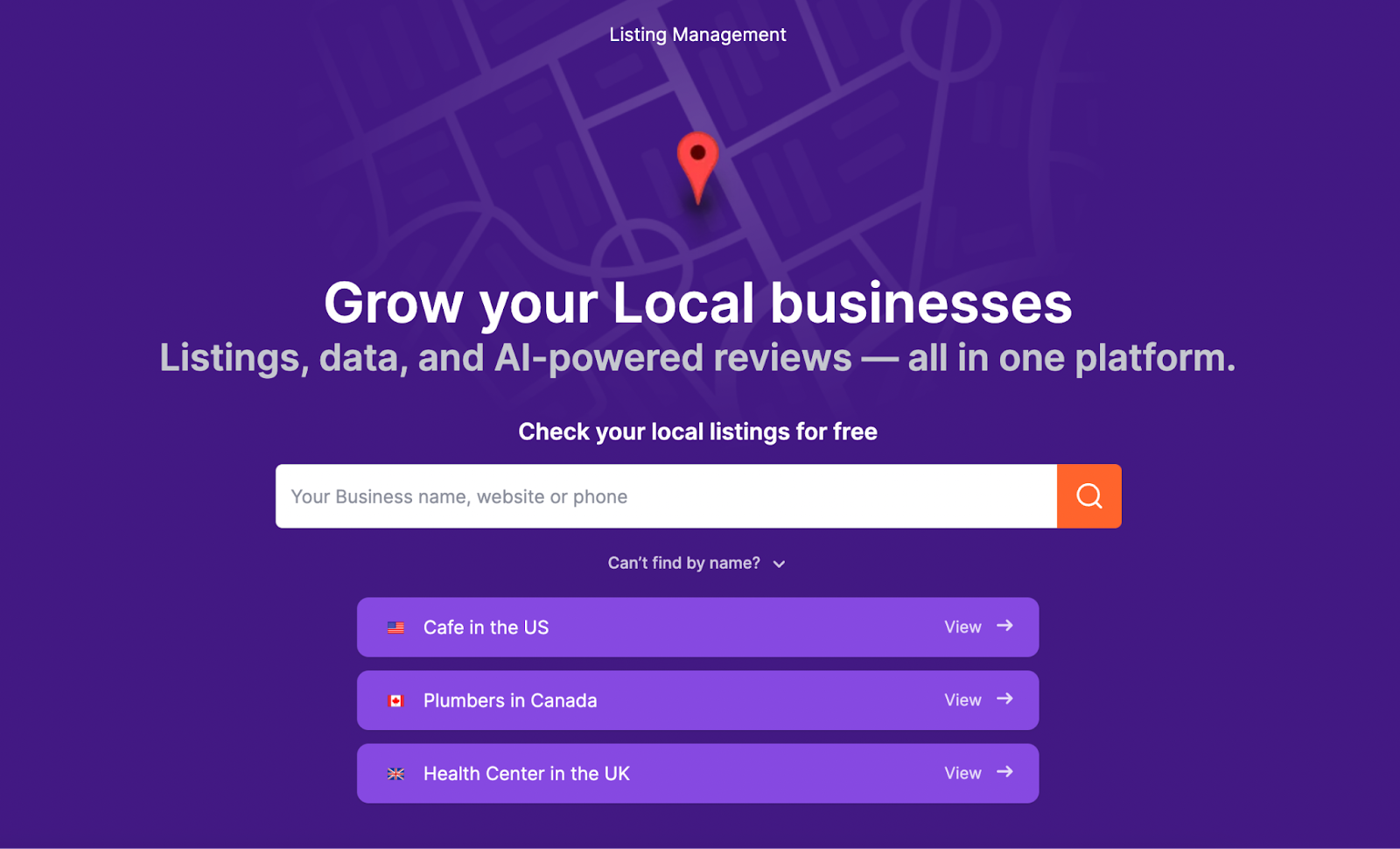
Key Features
- Centralized data management: Input your business details once and let Semrush distribute them accurately across the web.
- Review handling: Keep tabs and respond to customer feedback from a unified dashboard for enhanced reputation management.
- Enhanced visibility: Distribute accurate business details and maintain precise location data on up to 72 platforms, including Apple Maps and other integrations.
- Voice search ready: Prepare your business for voice searches on platforms like Amazon Alexa and Google.
- One-time data editing: Edit business information in one place. It updates everywhere, ensuring data accuracy.
- Easy recommendations: Get tips to improve your local search results.
- Duplicate suppression: Identify and remove duplicate listings, making your business easier to find.
- Review and user suggestion monitoring: Track reviews and user suggestions, allowing for quick updates and improvements.
- Localization: Works for businesses in multiple countries, ensuring global visibility.
- Customized notifications: Receive tailored email notifications with unique insights and performance reports.
- Premium features: Upgrade for access to advanced features like Heatmap and extended Review Analytics for deeper insights and management.
Here’s how to get started:
Click “Listing Management” from the left-hand sidebar under “On Page and Tech SEO.” Then, enter your business name into the search box and click the search button.
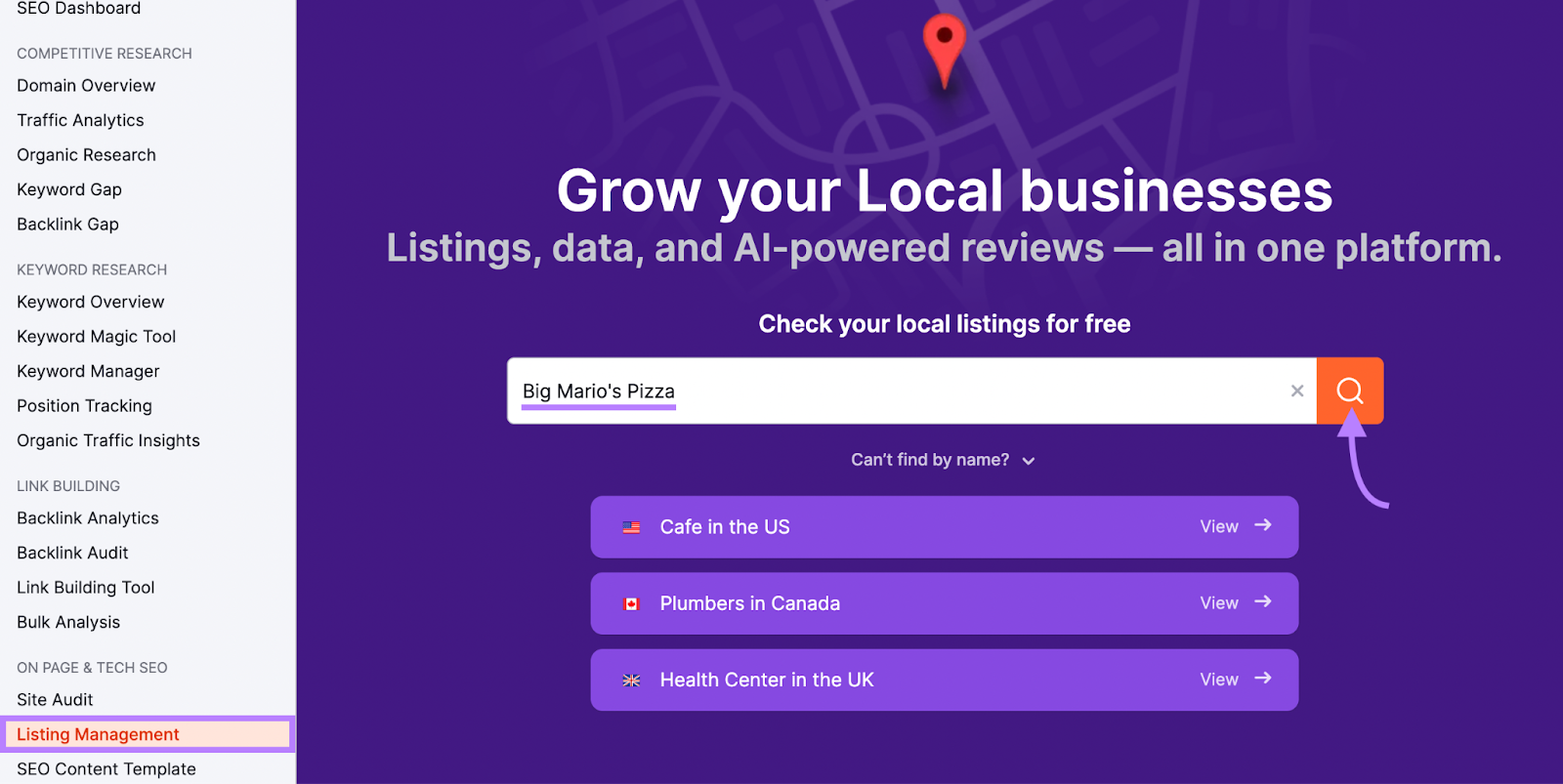
The tool will review and parse your business data across various directories. This includes Amazon Alexa, Apple, Bing, and Google. Then, it will provide feedback on potential issues.
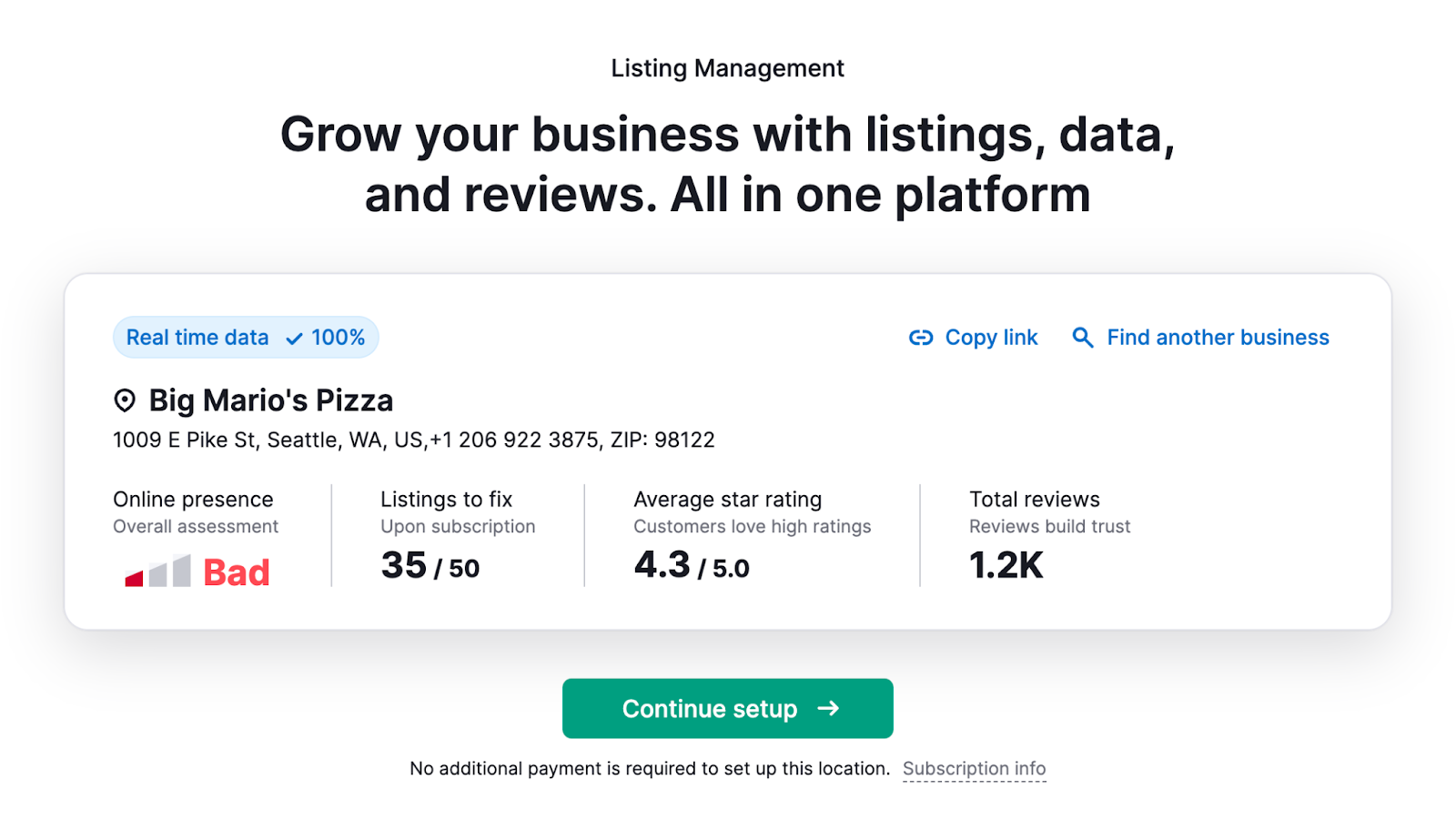
If you scroll down to the “Fix these to improve and expand your coverage” section, you’ll see a list of each directory or listing site. You will receive statuses like “Issues not found,” “Not present,” and “Wrong business name/phone/address” for each one.
This gives you a site-by-site breakdown of how your business appears across the web.
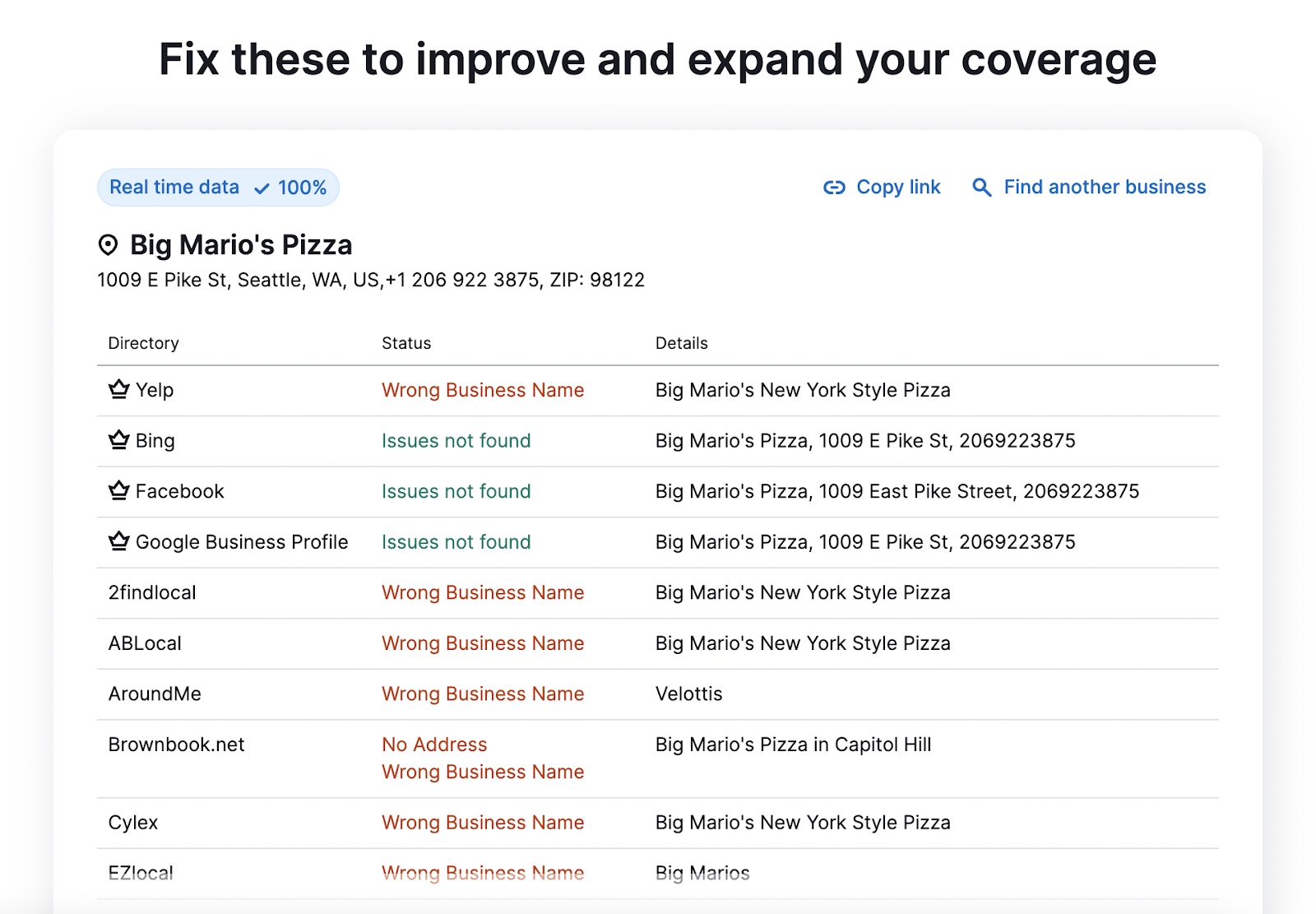
To set up your profile, click the “Continue setup” button under the “Listing Management.”
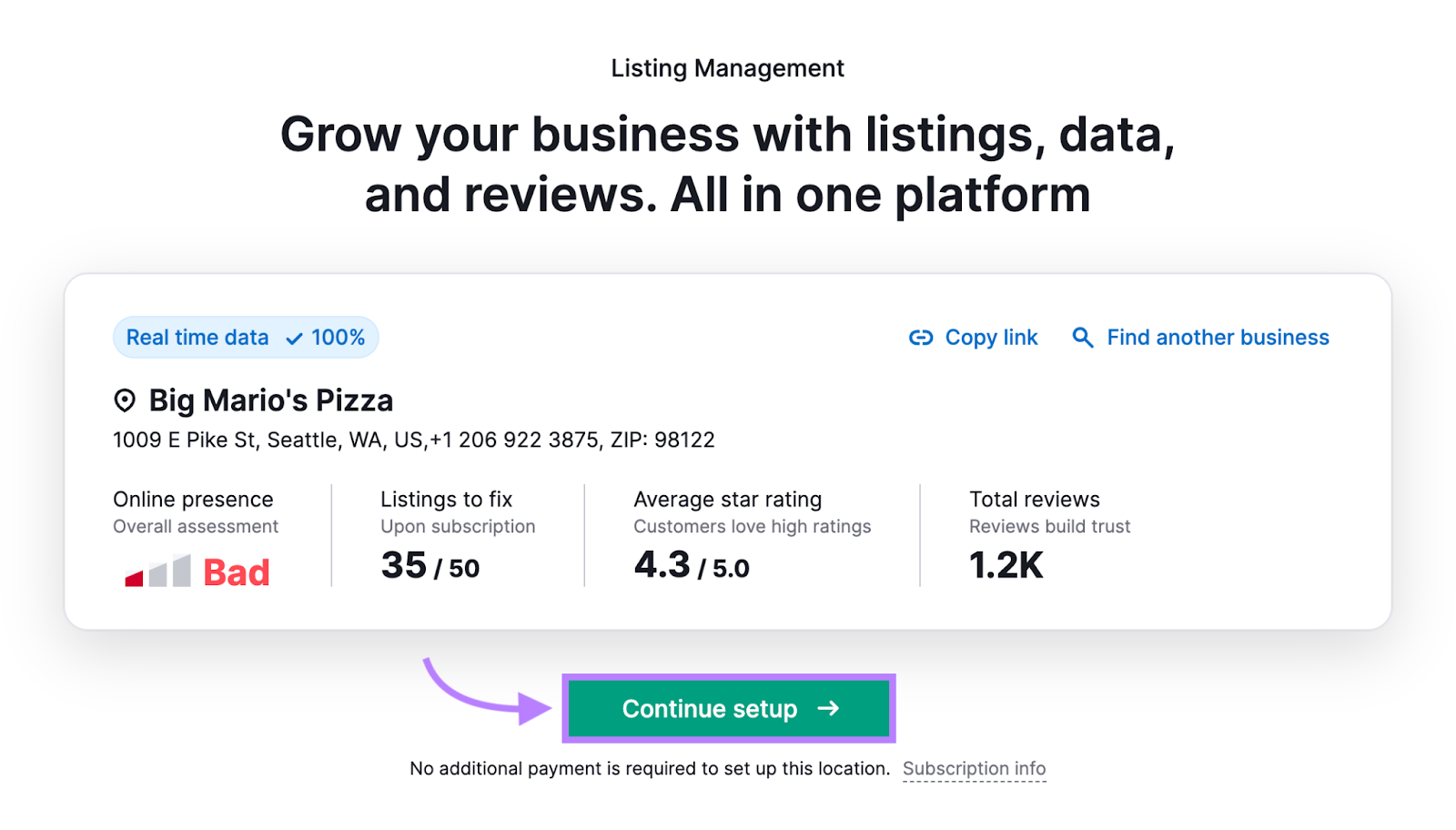
Here, you’ll be prompted to input and validate your business details.
Enter or confirm the details in the “City,” “State,” and “Brand name” boxes. Then click “Select categories.”
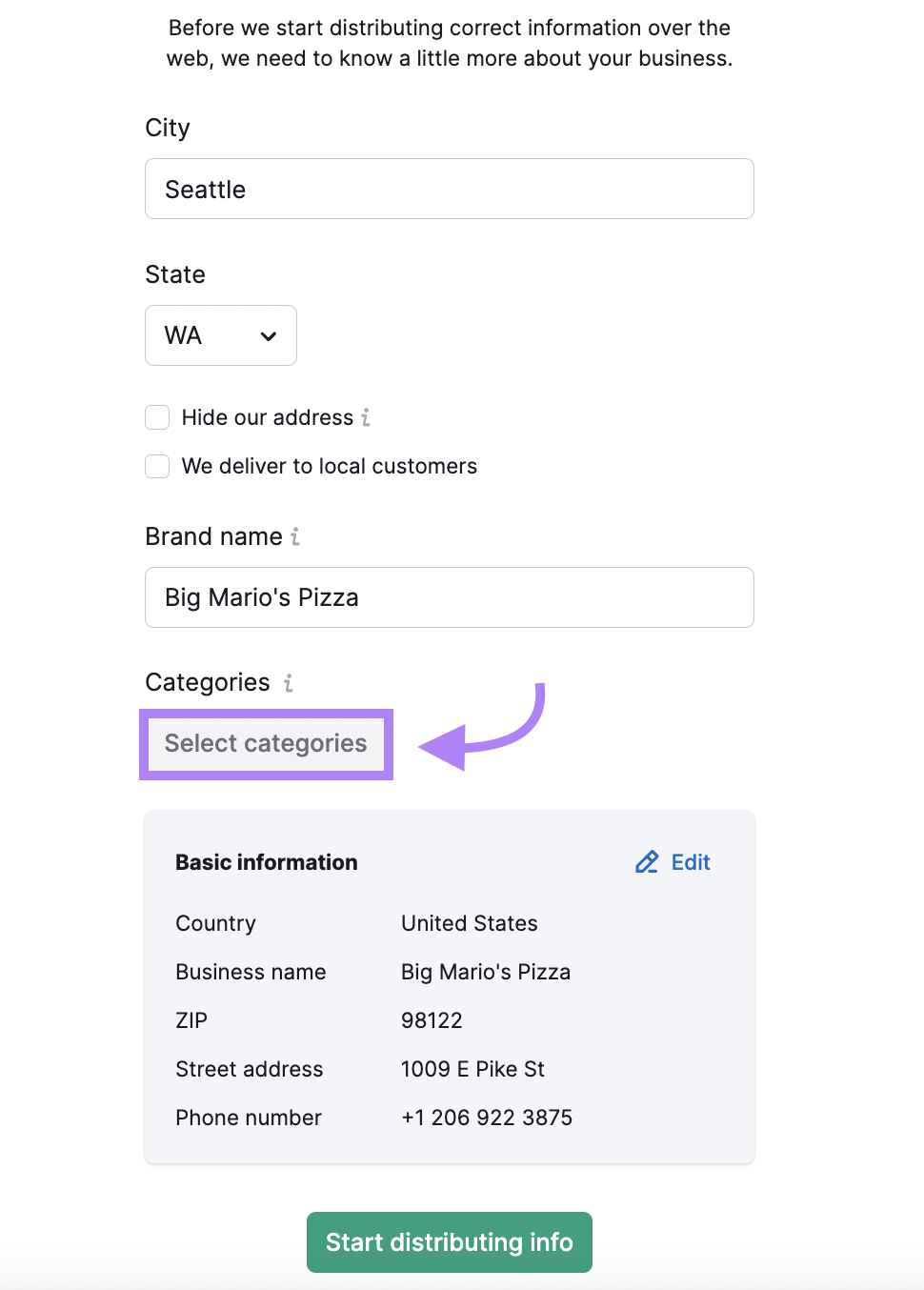
From the “Choose categories” screen, select the categories that are relevant to your business. You’ll choose one primary category and up to nine additional categories. It’s recommended to choose all 10 if applicable.
When you’re done choosing categories, click “Apply categories.”
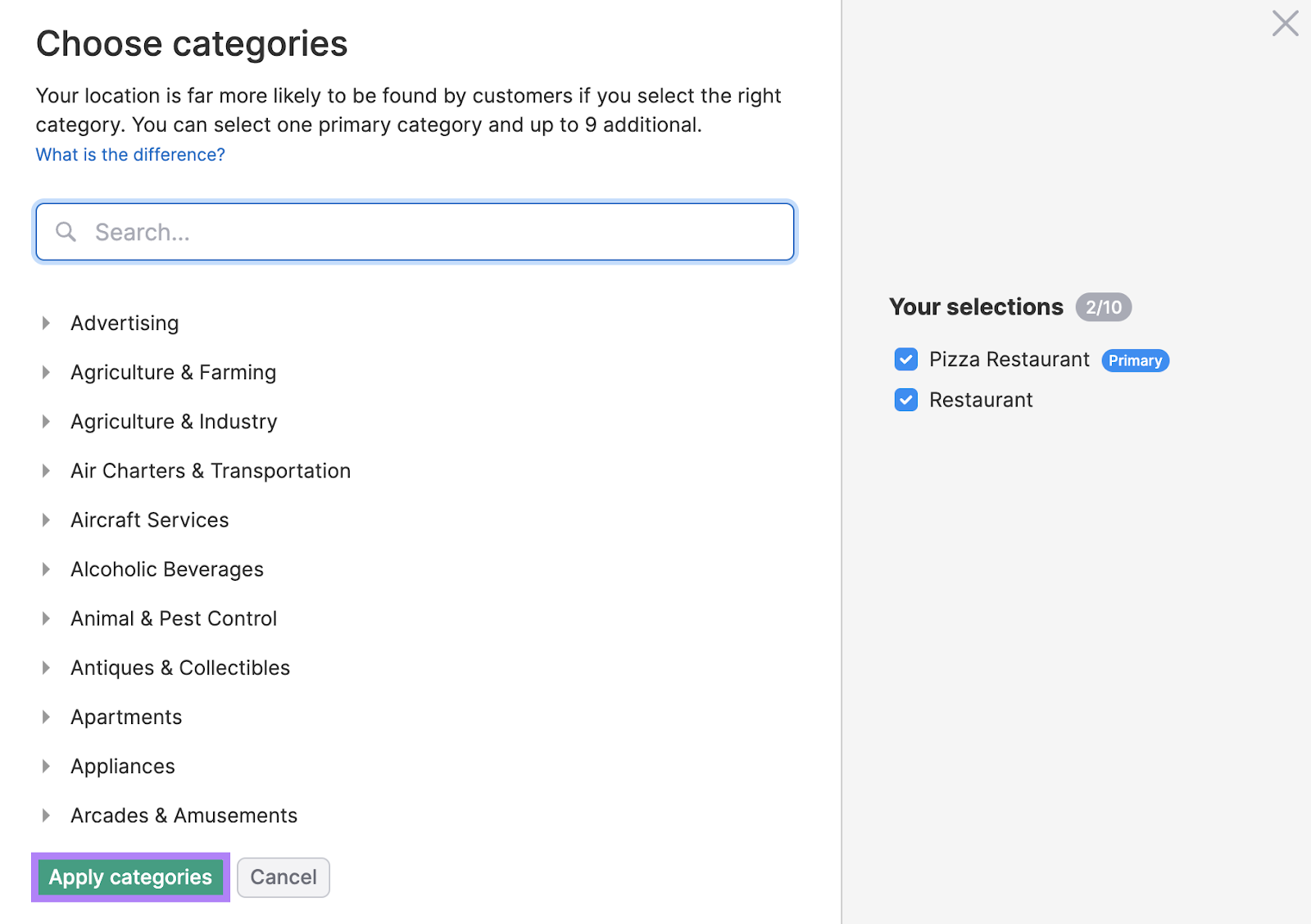
Next, review the details populated in the “Basic information” box.
If any details need to be updated, click the “Edit” link. Otherwise, click “Start distributing info.”
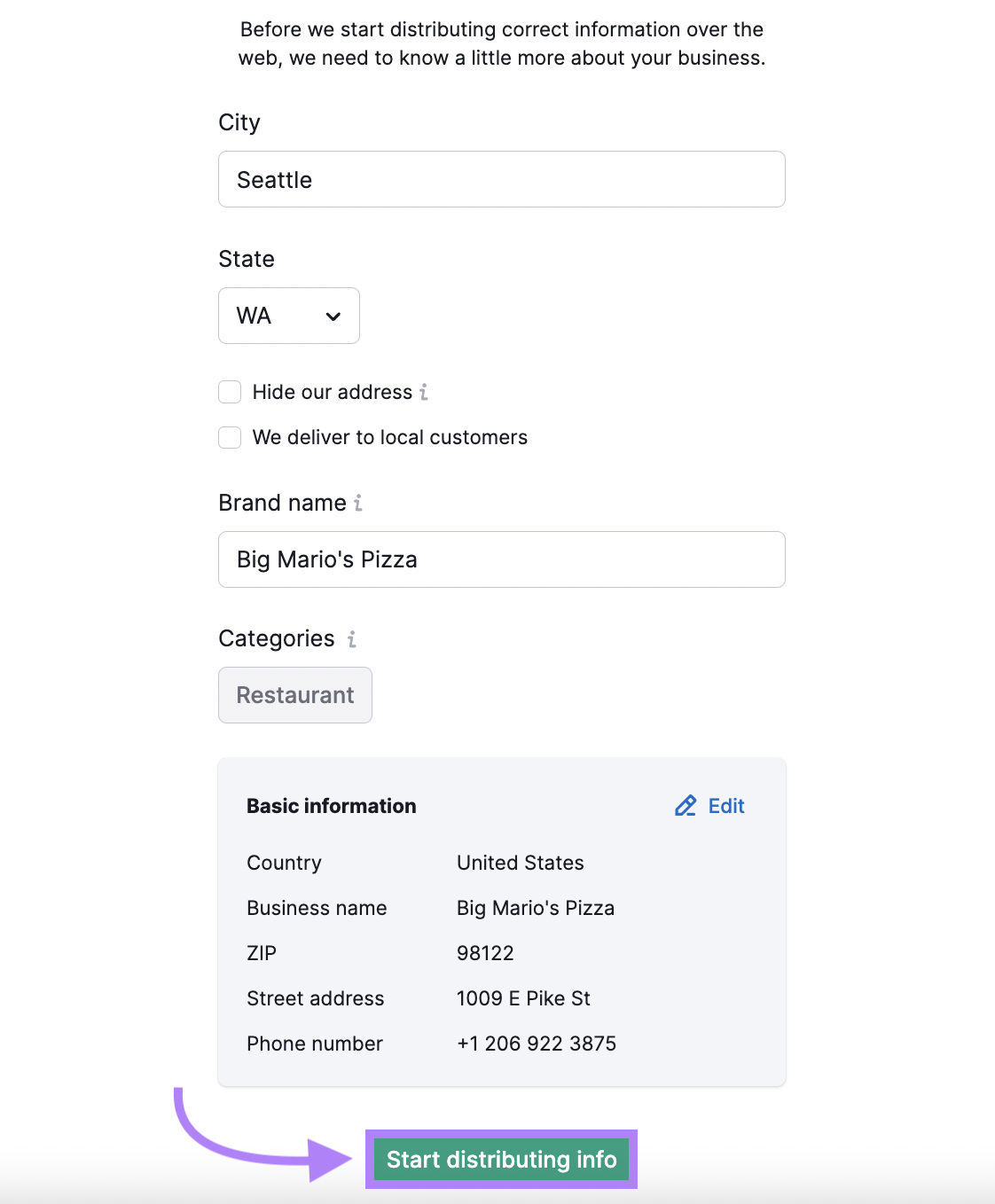
Now you’ll be taken to the “Listing Management” page where you can set up and manage your business listings.
Managing Your Locations
You can track and manage all your business locations in the “Locations” tab.

Click on any location for more details. This includes data like the total number of listings and the status of each listing.
Each status tells you what’s going on with your listing and if there’s any action required.
Editing and Updating Information
You can also edit your location details if required. Just click the “Edit Info” link at the top right corner.
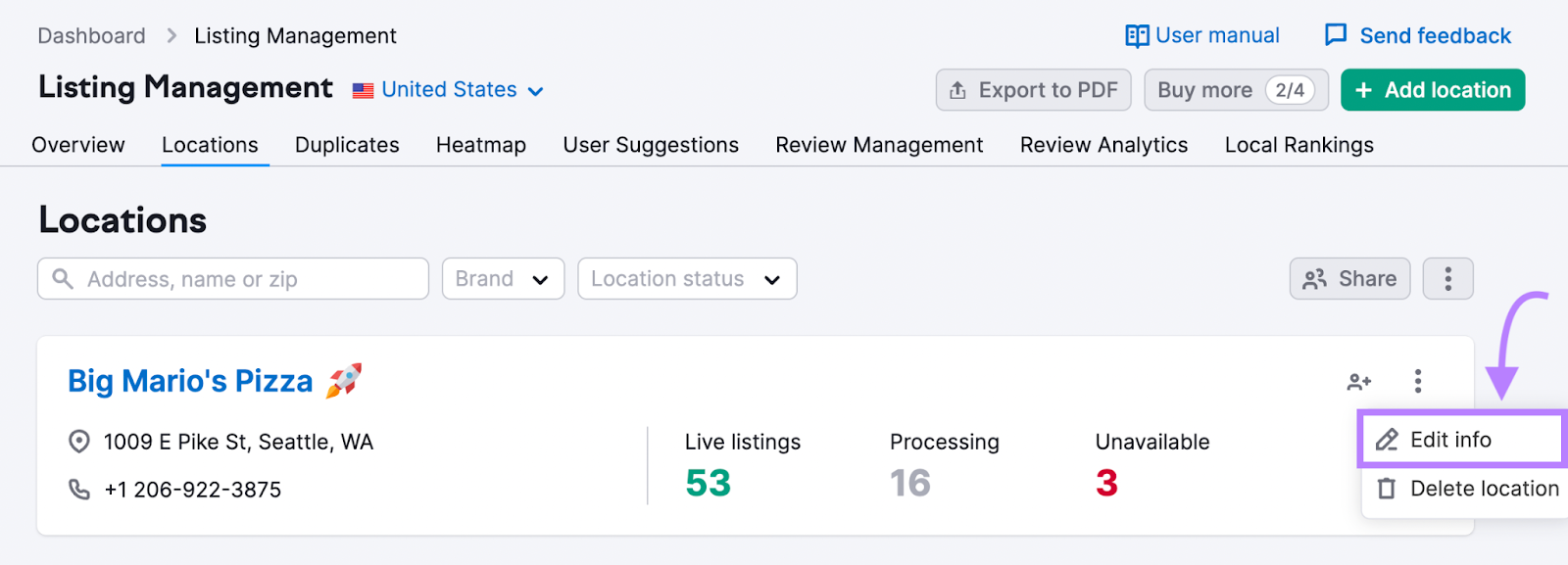
From the “Edit Location” screen, you can review details and make edits to each location for your business.
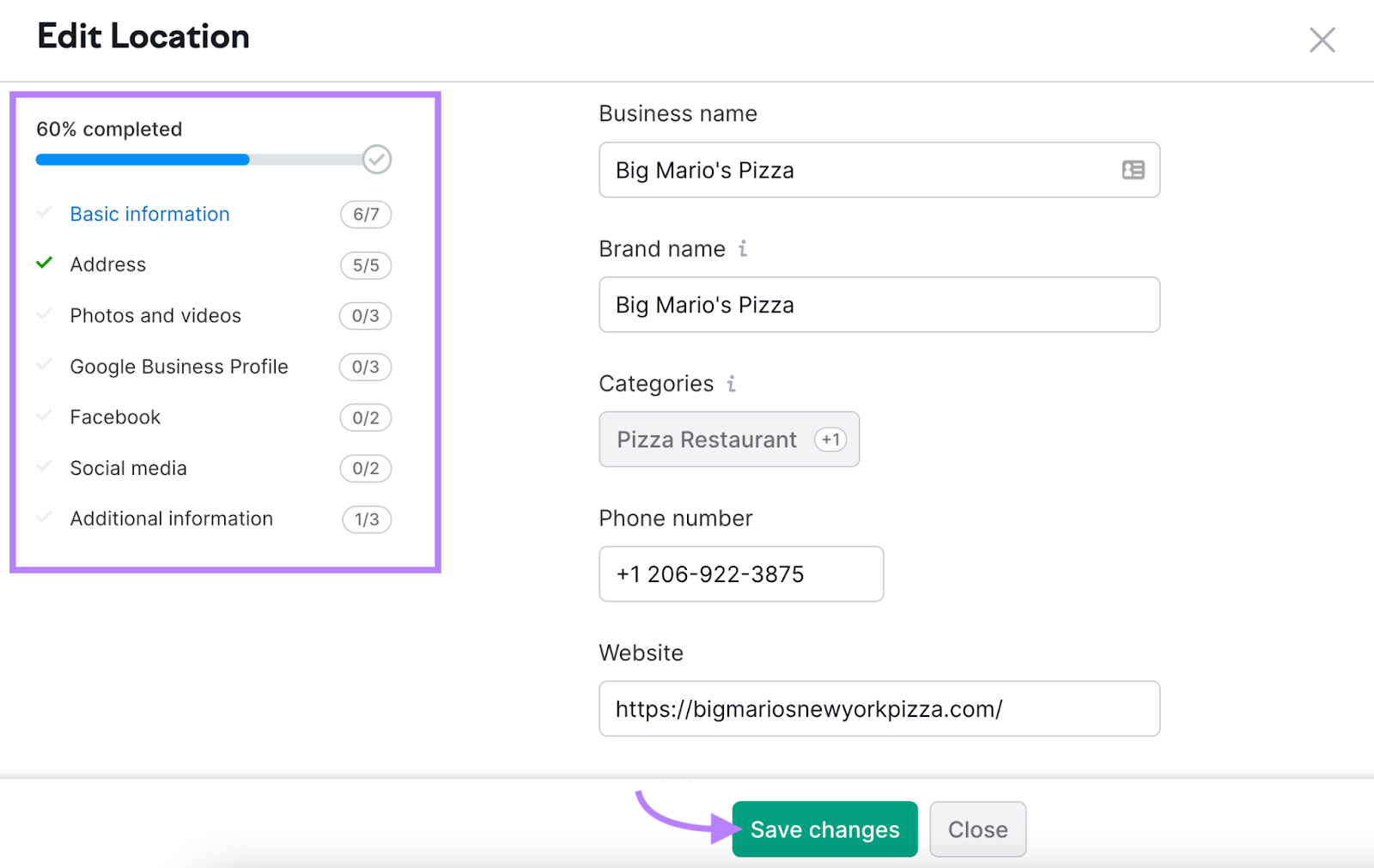
From this screen, you can update all of the details of your listing:
- Basic information: Update business name, brand name, category, phone number, website, and business description.
- Address: Update physical address and map location.
- Photos and videos: Provide media to showcase your business.
- Google Business Profile: Connect your GBP to the listing.
- Facebook: Connect your Facebook page to the listing.
- Social media: Connect additional social accounts to your listing like Twitter and Instagram.
- Additional information: Create a featured message (call to action) and clarify your payment methods.
Further reading: What Websites Can I Hide My Address From With Listing Management?
If you have multiple locations, use the “Bulk edit” feature to update several listings simultaneously.
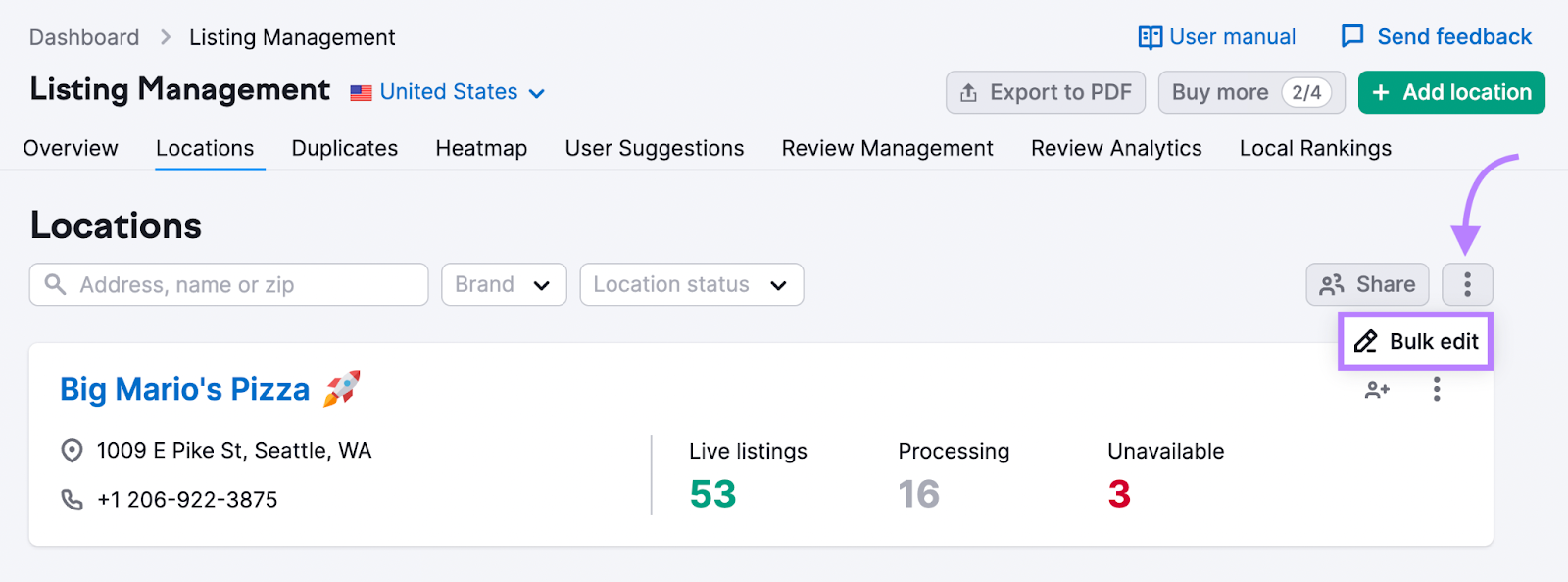
Export and Analysis
You can also export your listings and reports for better analysis and reporting.
Just click the “Export to PDF” button.
On the “Locations” report page:
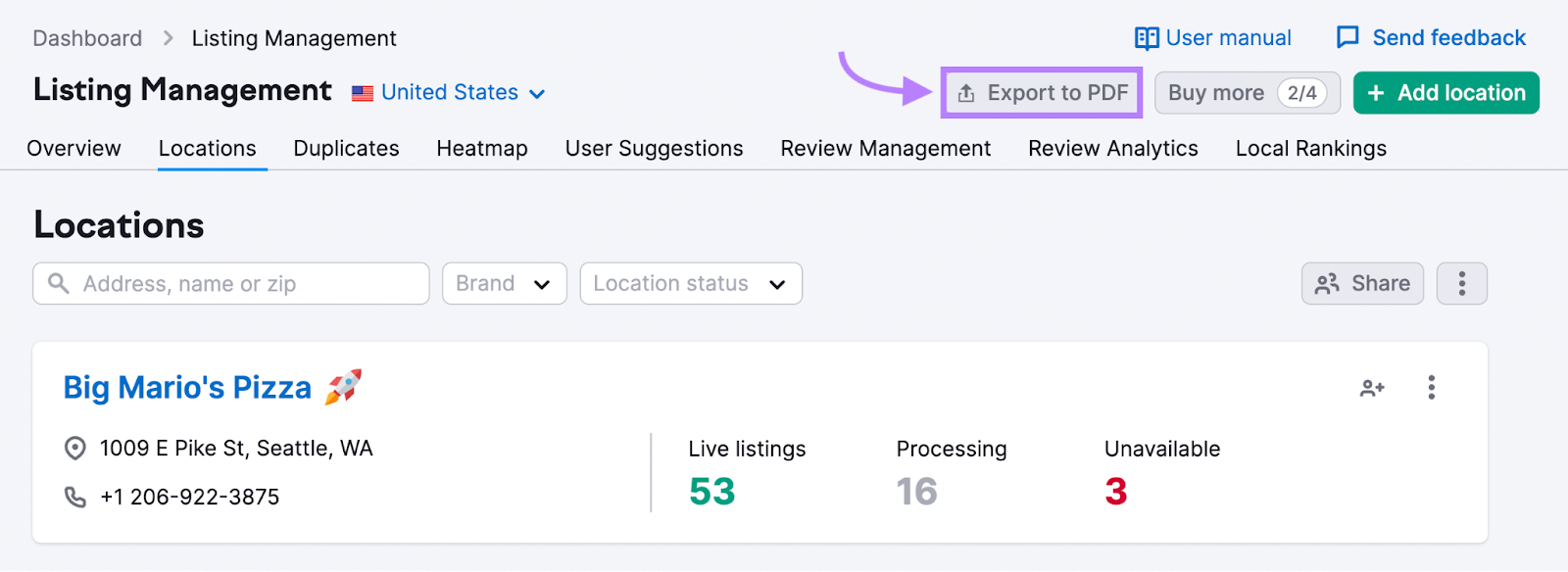
Duplicates and User Suggestions
Use the “Duplicates” tab to suppress any duplicate listings. This helps in ensuring that potential customers find the correct business information.
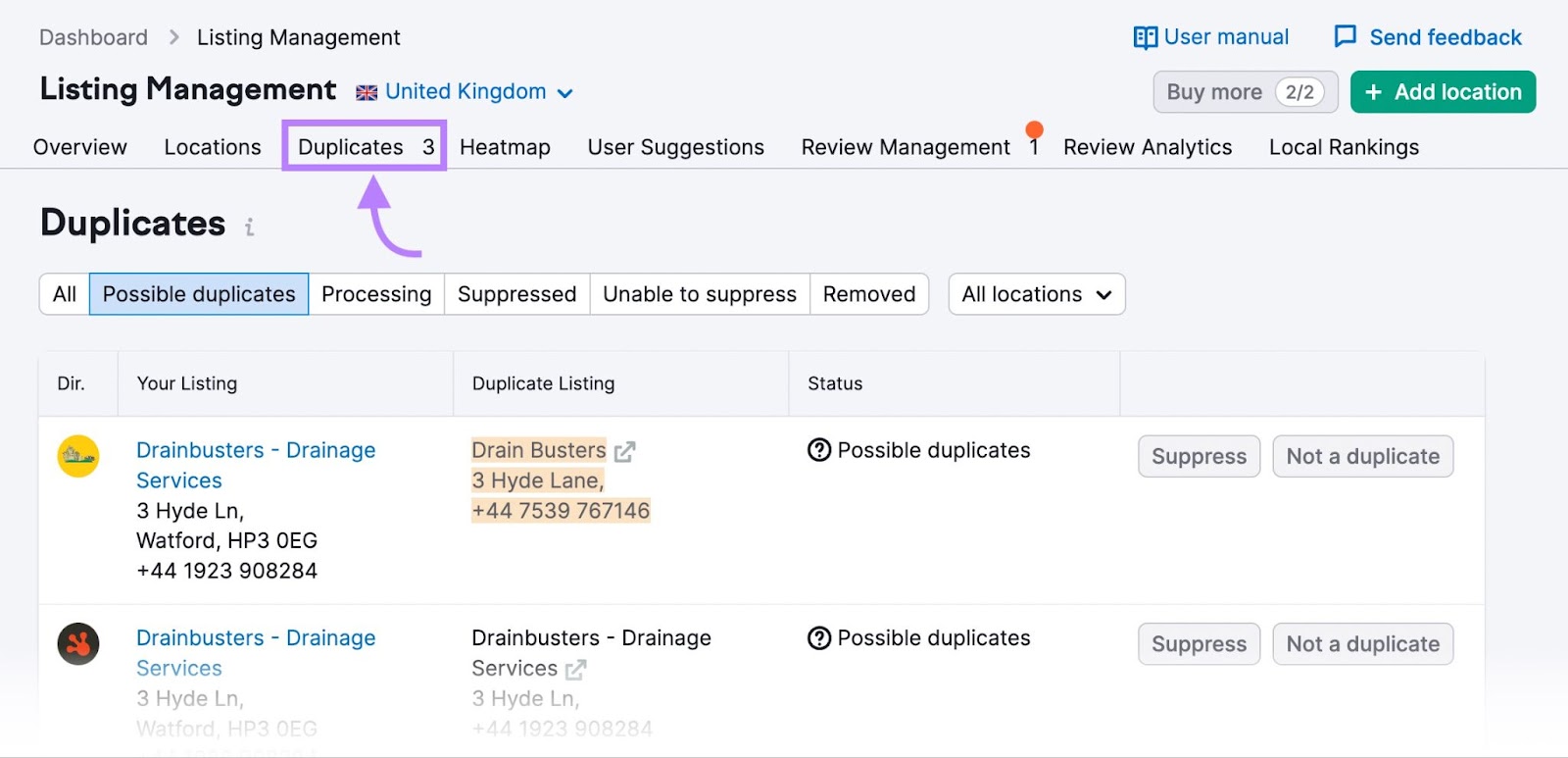
In the “User Suggestions” tab, manage and approve or reject any user-suggested changes to your business information.
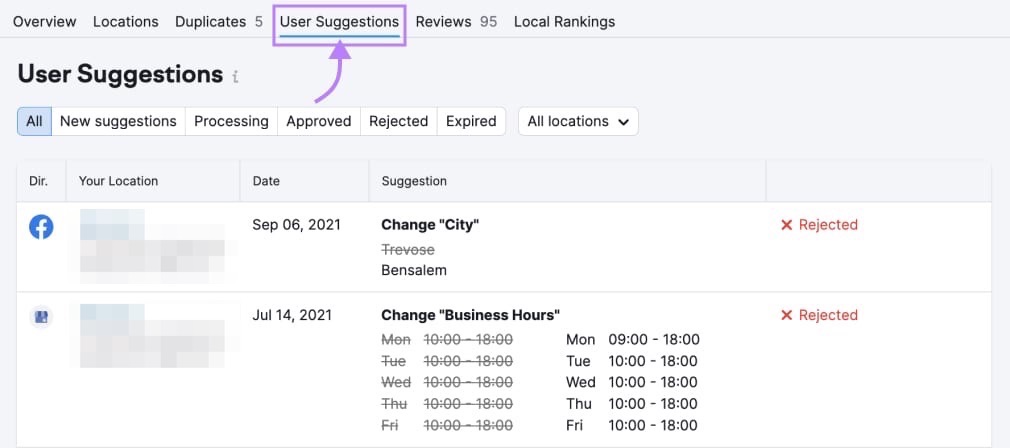
Reports and Notifications
After 1.5 months of setting up, you will receive location reports via email every two weeks. You will be given five important data sets:
- Searches: The number of times your business appeared in search results on a variety of platforms.
- Profile views: The number of times your profile was viewed across a variety of platforms.
- Facebook page views: The total number of business Facebook page views.
- Google search views: How many times your business was viewed in Google search.
- Google Map views: How many times your business was viewed in Google Maps.
Here’s an example of what that report looks like:
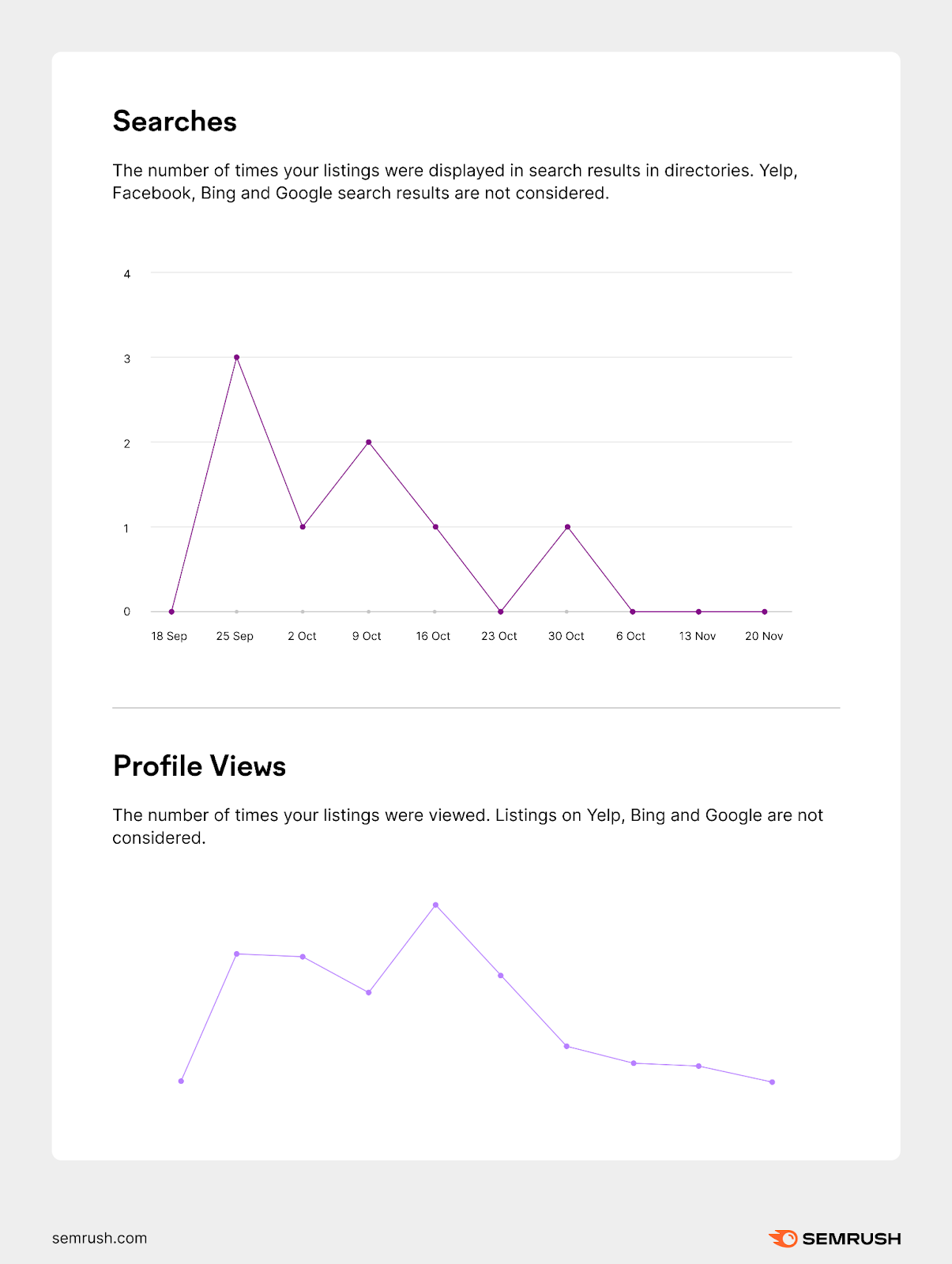
You will receive weekly email notifications for reviews with two stars or less to manage and respond immediately.
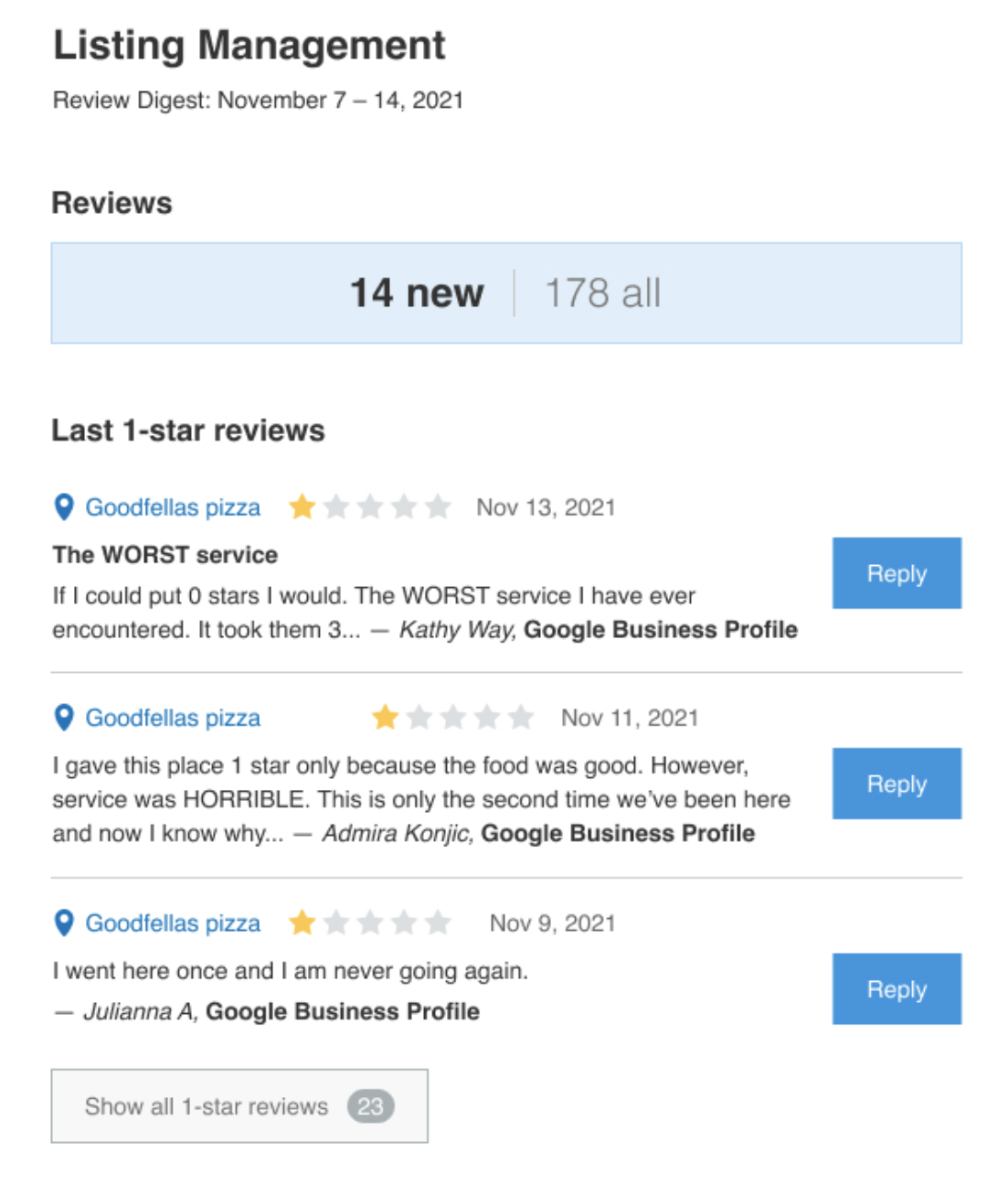
Heatmap
Heatmap is a feature that shows you how well your business ranks on search engines at different spots around a specific area.
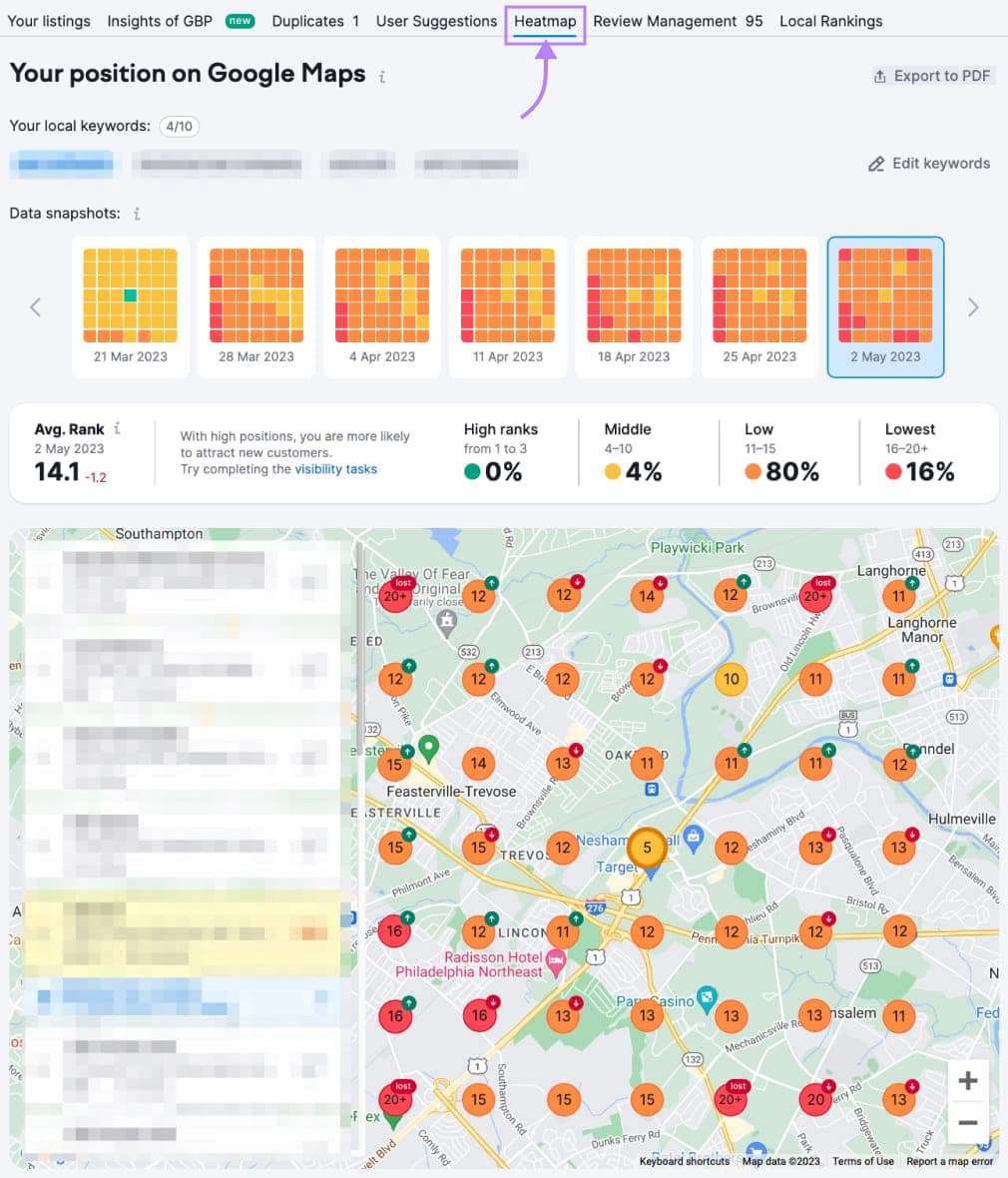
Here’s how it works:
- Track keywords locally: You can pick up to 10 keywords that matter to your business. The heatmap then shows where you rank for these words around your business area.
- Check your SEO impact: The colors on the heatmap tell you if your SEO is working. Hot spots mean you’re ranking high right where it matters.
- Scan radius and grid size: You can zoom in for a tight look or zoom out for a big picture. This helps you see how your business ranks in specific parts of town vs. the wider area.
- Weekly updates: Every week, you’ll see if your rankings have changed. This keeps you updated on your local SEO efforts.
- Spy on competitors: Heatmap shows you the top 10 businesses you’re up against for specific keywords. You’ll see reviews, locations, and more, giving you insights into how you stack up against your competition in local search results.
With Heatmap, you’ll have a weekly snapshot of where your business stands on local searches, helping you make smarter SEO moves.
Review Management
Click the “Review Management” tab to see, track, and manage reviews left by users across connected platforms.
Using this view, you can collect all of your reviews and respond to those directly from Semrush. This is critical for managing your business’s online reputation.
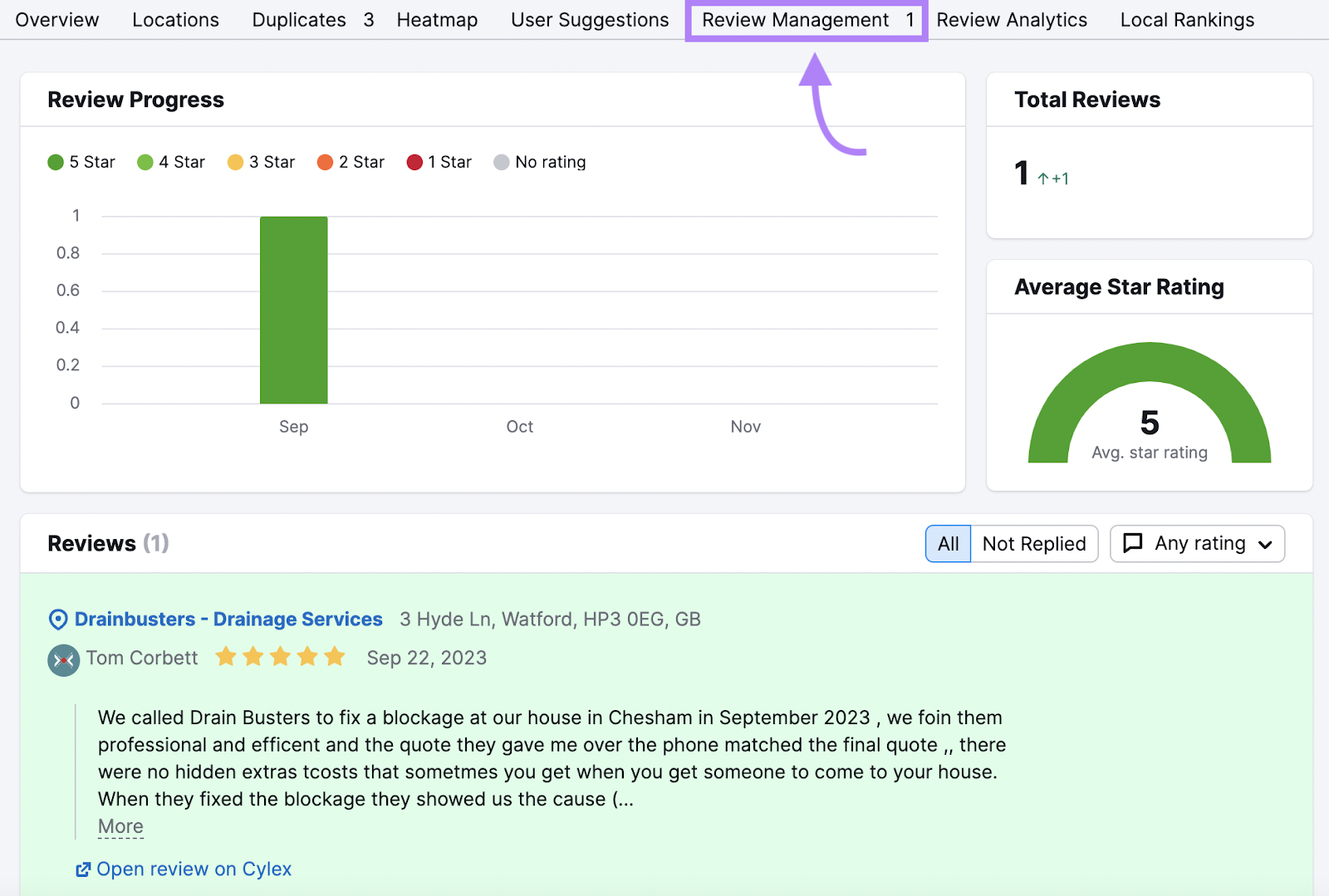
Review Analytics
Review Analytics allows you to compile reports about competitors’ reviews and get analytics about their review profiles.
You can use these reports to identify gaps in their strategy and discover opportunities to enhance your listing.
For example, the following report shows how many reviews competitors have, what the average rating is for one or three months, and how often competitors respond to reviews:
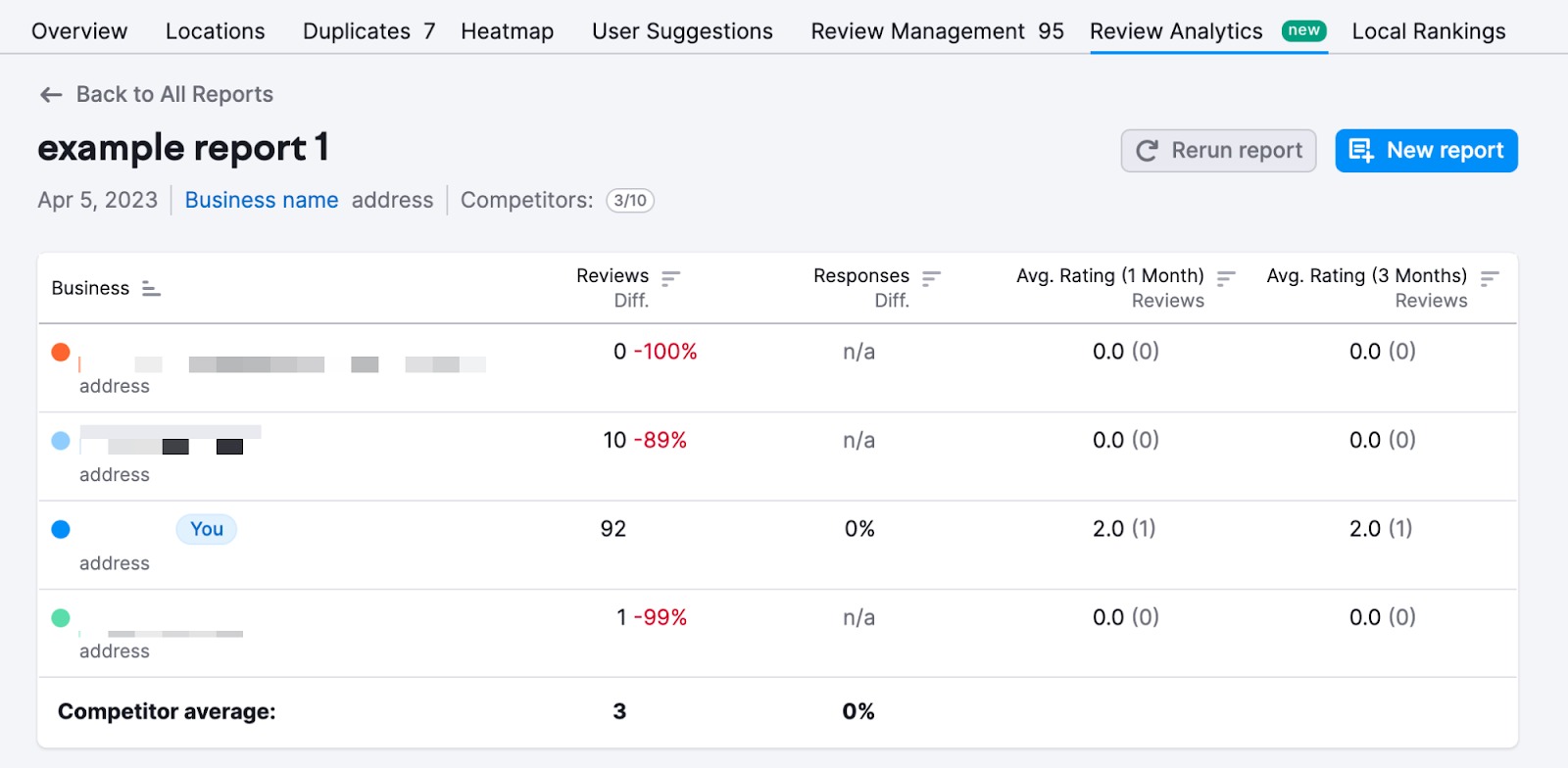
You can also see a list of competitors’ reviews:
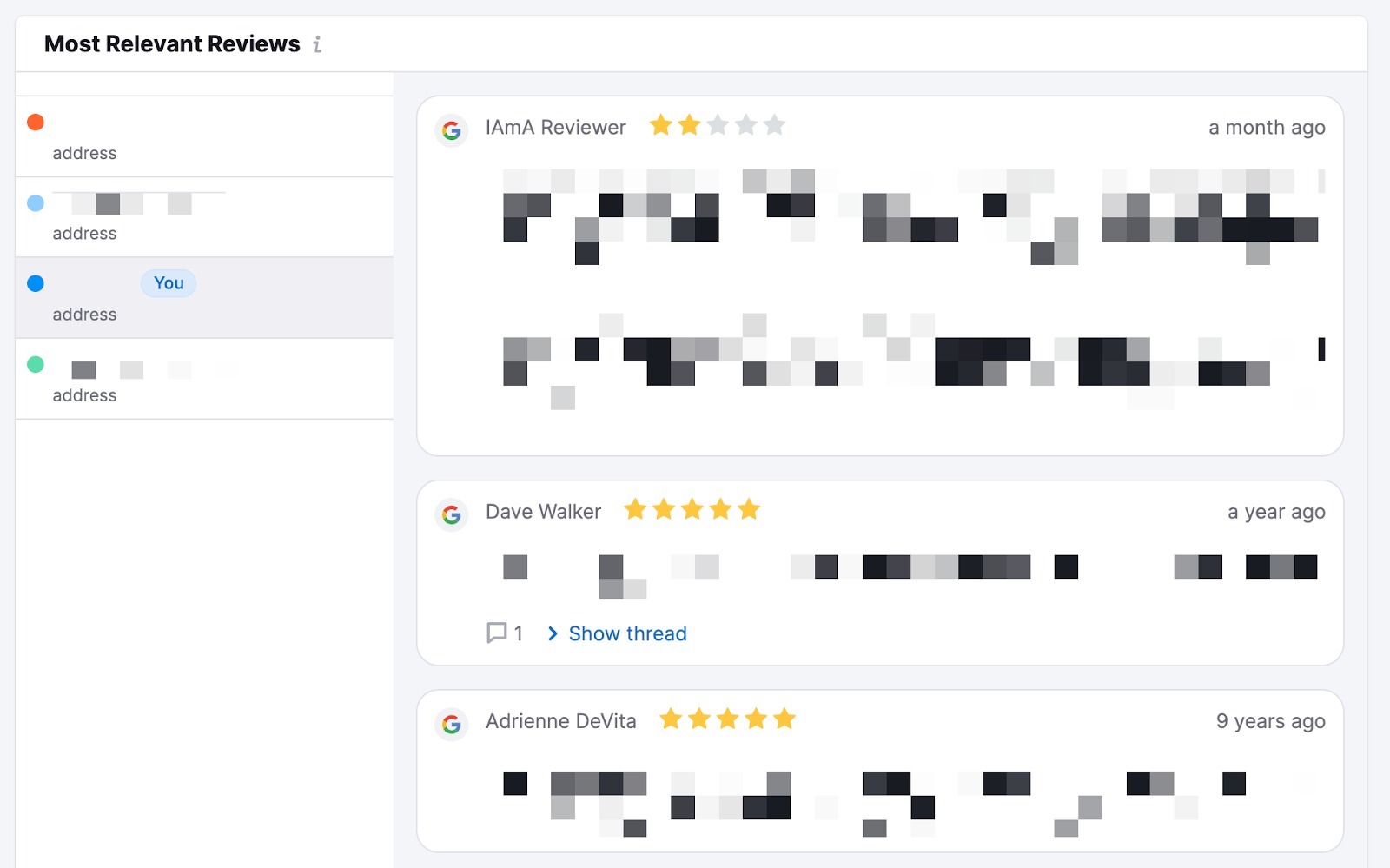
And categories and attributes from competitors’ Google Business Profiles:
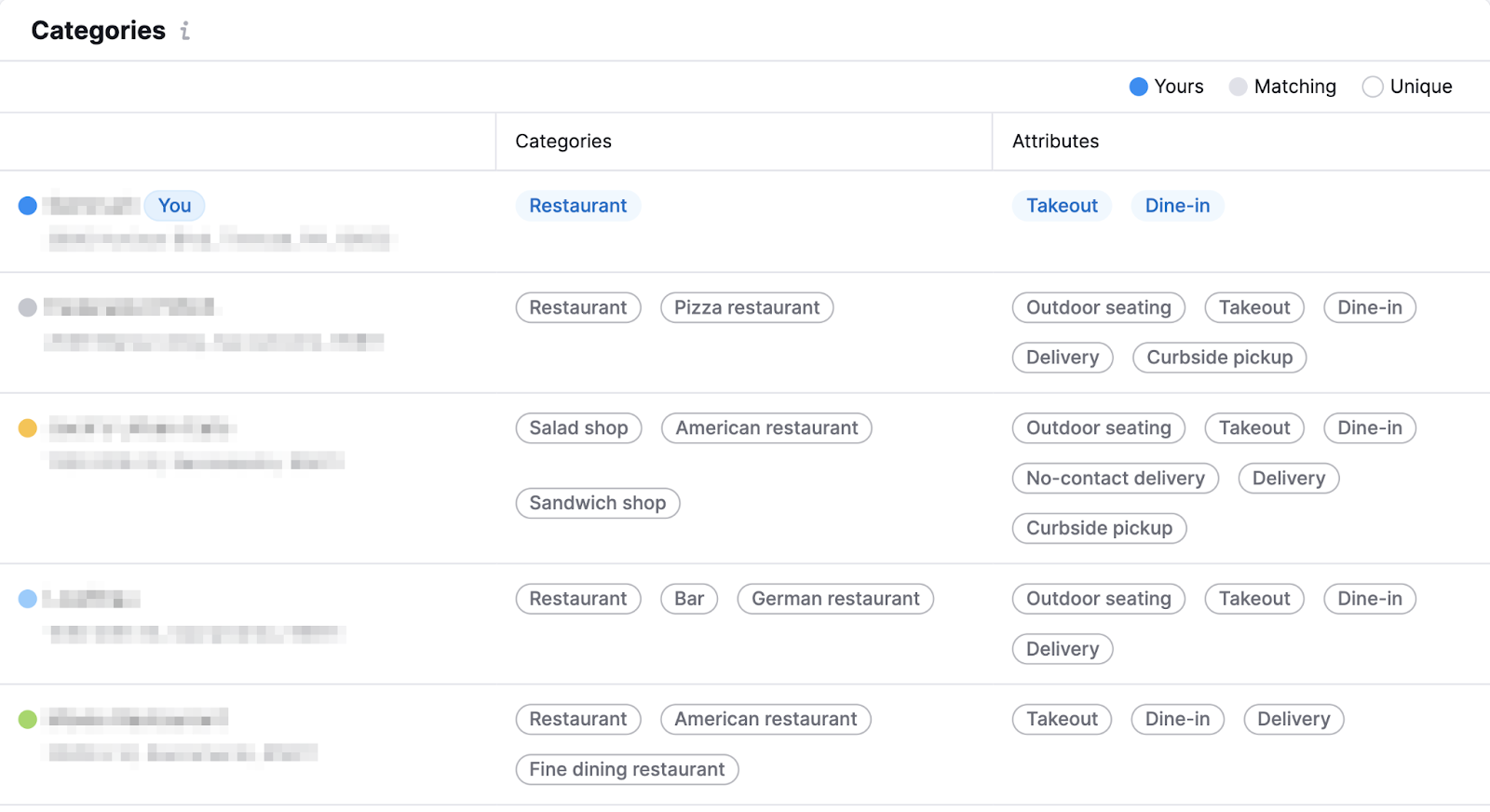
Cost: Add Listing Management and Review Management for +$20 per month. Or upgrade to the Premium plan, which has the basic features plus:
- Track Google Maps rankings with Heatmap.
- Spy on your competitors and get useful stats to optimize your strategy and surpass them in local search.
- Respond to online reviews with AI suggestions.
- Analyze competitor reviews.
Now, let’s jump into eight more local listing management tools. Each section will feature key benefits and a cost breakdown.
1. Moz Local
Moz Local helps you manage your business listings across numerous platforms. This ensures that customers always find correct and helpful information about your business.
It has a “Search Visibility Score” feature, which allows tracking of your online presence to understand where you shine or may need improvement.
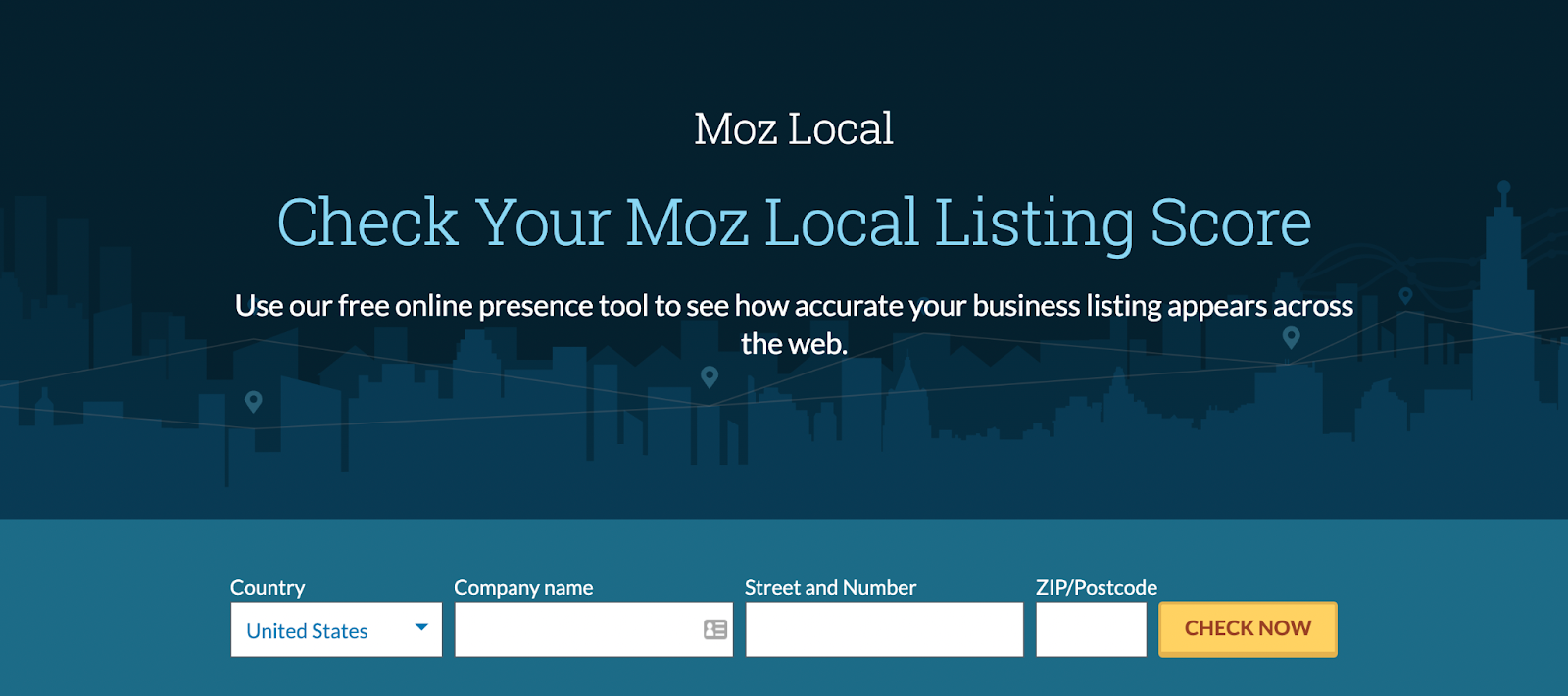
Key Features
- Intuitive suggestions: Receive smart suggestions to optimize your listings and improve visibility.
- Search visibility score: Evaluate the visibility of your business listings in search results.
- Local rankings: Track how your business performs in local search results.
Cost: Starting at $14/mo per location
2. Yext
Yext allows you to engage directly with customer queries online. Direct interaction and accurate information build customer trust. Yext helps you drive online and offline engagement.
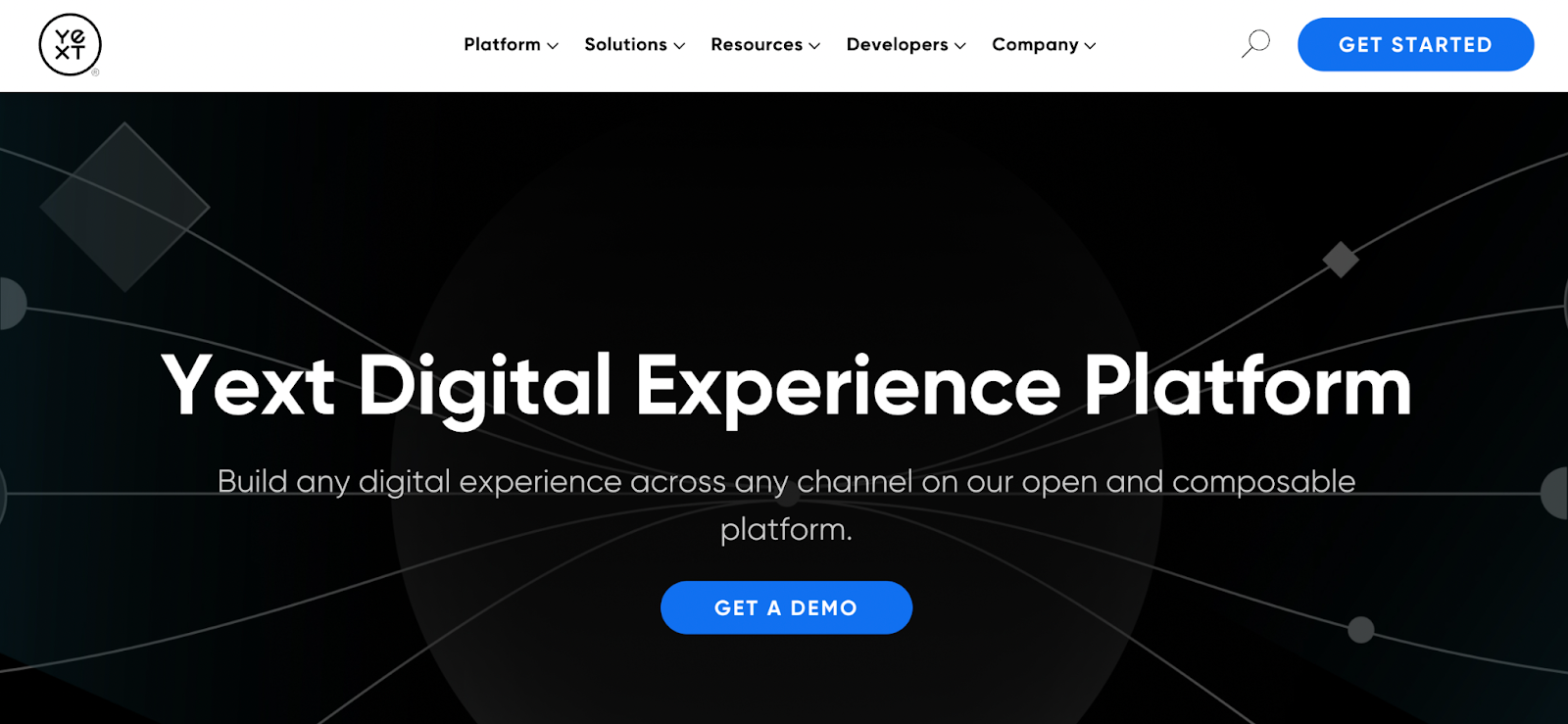
Key Features
- Easy CMS: The Content Management System can help manage and share your business information quickly and consistently across different platforms.
- Quick updates: Update your business info fast. When you make changes, it quickly shows on all websites.
- Two-way communication: Enable direct communication on several connected platforms such as Google My Business, Bing, Yelp, and others. This feature facilitates real-time feedback and enhances the effectiveness of your business listings through direct interactions.
Cost: Starting at $4 per week for basic listing management. To connect with “Essential” platforms like Google, Facebook, Yelp, and Bing, the price begins at $9 per week (approximately $36 per month). This tier offers a broader reach, ensuring your business is visible on major directories and search engines.
3. ReviewTrackers
ReviewTrackers aggregates customer feedback from various online sources. This provides a holistic view of your online reputation.
Using the data ReviewTrackers provides, you can create a strategy for managing reviews, responding to questions, and improving your brand’s reputation across the web.
Listening to customer feedback allows you to improve your offerings and customer service. This helps create a positive reputation and encourages repeat business.
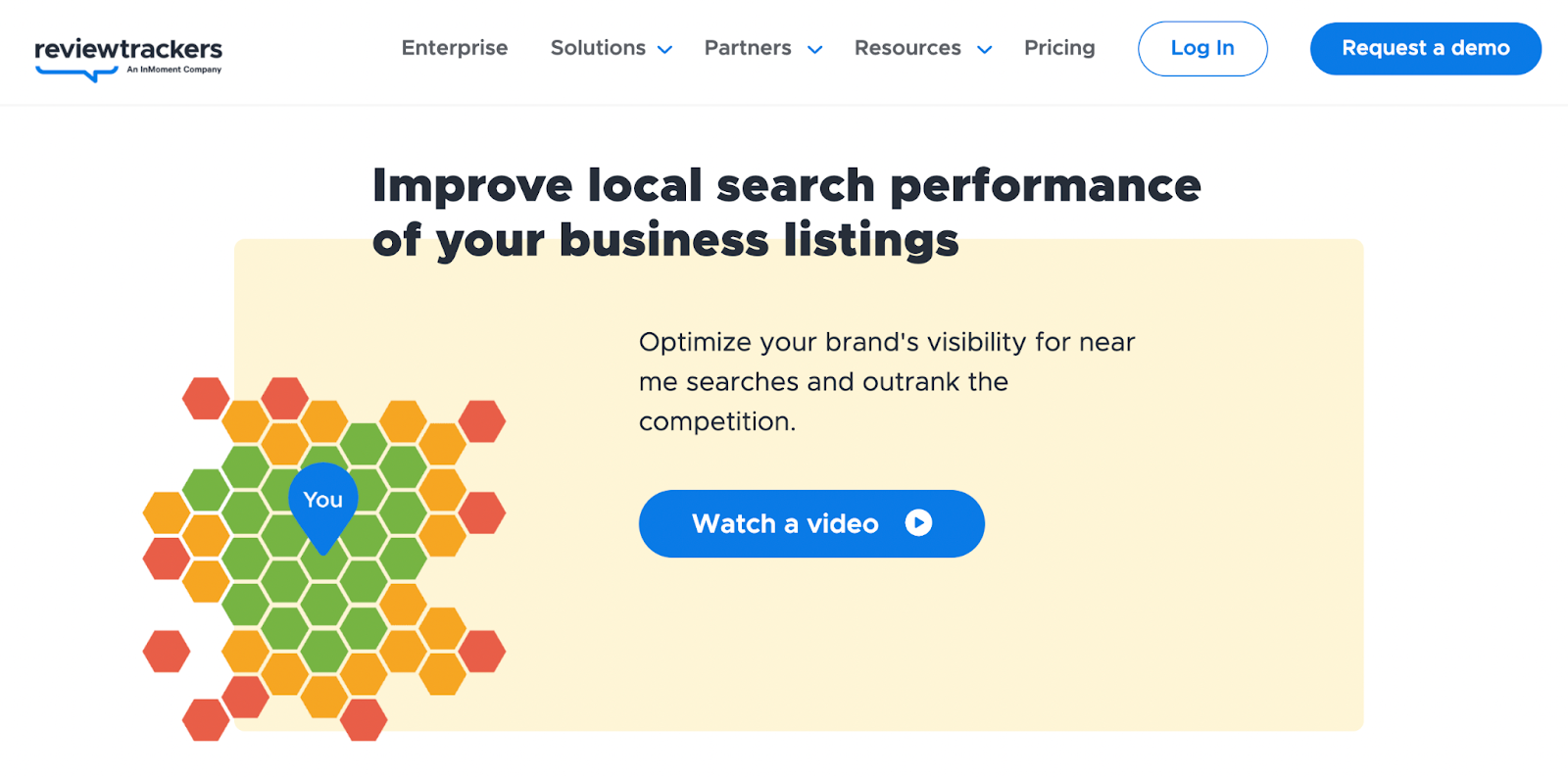
Key Features
- Review collection and monitoring: Collect and monitor customer reviews from over 100 websites. You’re notified of new reviews, which helps you respond quickly.
- Analysis and alerts: Find common issues and topics in customer feedback. Get alerts for specific keywords.
- Easy integration: Integrate with other tools like Hootsuite and Zapier. This makes managing reviews easier and more connected.
- View and manage reviews: View your online reviews in a simplified stream. You can use filtering options to focus on the feedback that matters most to your business, allowing for more effective and prioritized management
Cost: Pricing varies based on the number of locations, with plans starting at $21 per location per month for businesses with over 200 locations. For smaller businesses with fewer than 10 locations, the cost is up to $119 per location per month.
4. BrightLocal
BrightLocal enhances your local online presence in Search Engine Results Pages (also known as “SERPs”) by ensuring your business information is accurate in local citations.
Local citations are online places like directories or business lists showing your business details. Think of them as online phone books.
With the right information, customers can find your business more easily when they search online. It’s like putting up more signposts that all lead to your business.
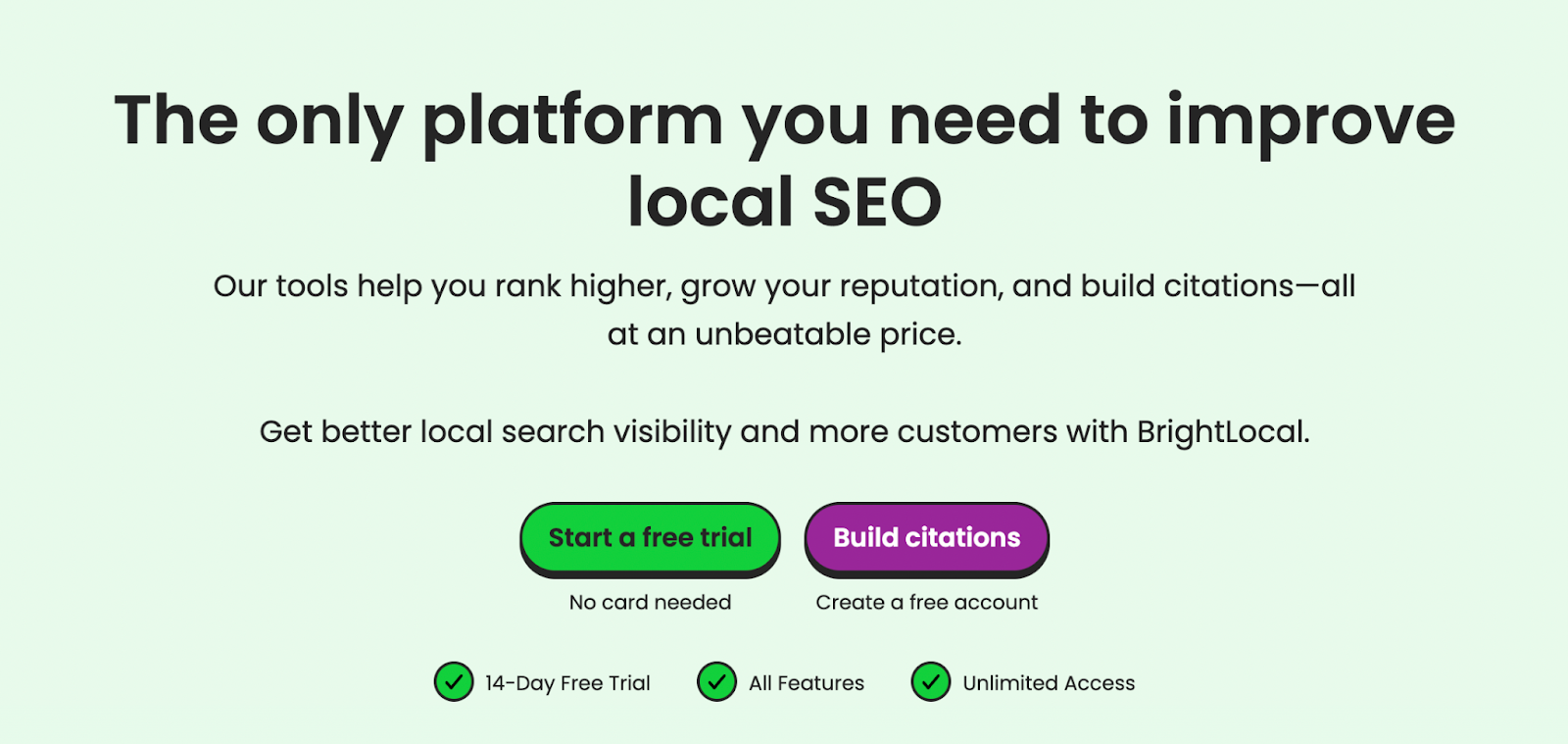
Key Features
- Citation builder for authority: Gain authority by building and fixing listings on relevant sites with the help of experts. Unlike other services, you own your listings forever without recurring fees. This ensures complete autonomy over your listings.
- Active sync for continuous engagement: This feature helps you keep your crucial listings accurate and secure. Manage all your locations through a single dashboard for immediate updates and enhanced organization.
- GBP post scheduler for effective posting: Manage Google Posts effortlessly by scheduling updates, offers, and events according to your preferred timing. It allows posting to multiple locations simultaneously. It also offers AI to enhance the content of your posts.
Cost: Price for the tracking tool starts at $39 per month per location. For listing management, the price begins at $49 per month for each location.
5. Birdeye
Birdeye helps businesses manage their online presence. It creates and updates business listings in one place with its single dashboard interface. Businesses can show up easily on Google, Facebook, and other sites.
This tool helps businesses control information like their address and hours across many online listings. This means business owners can make changes or updates in one spot, and it will update everywhere.
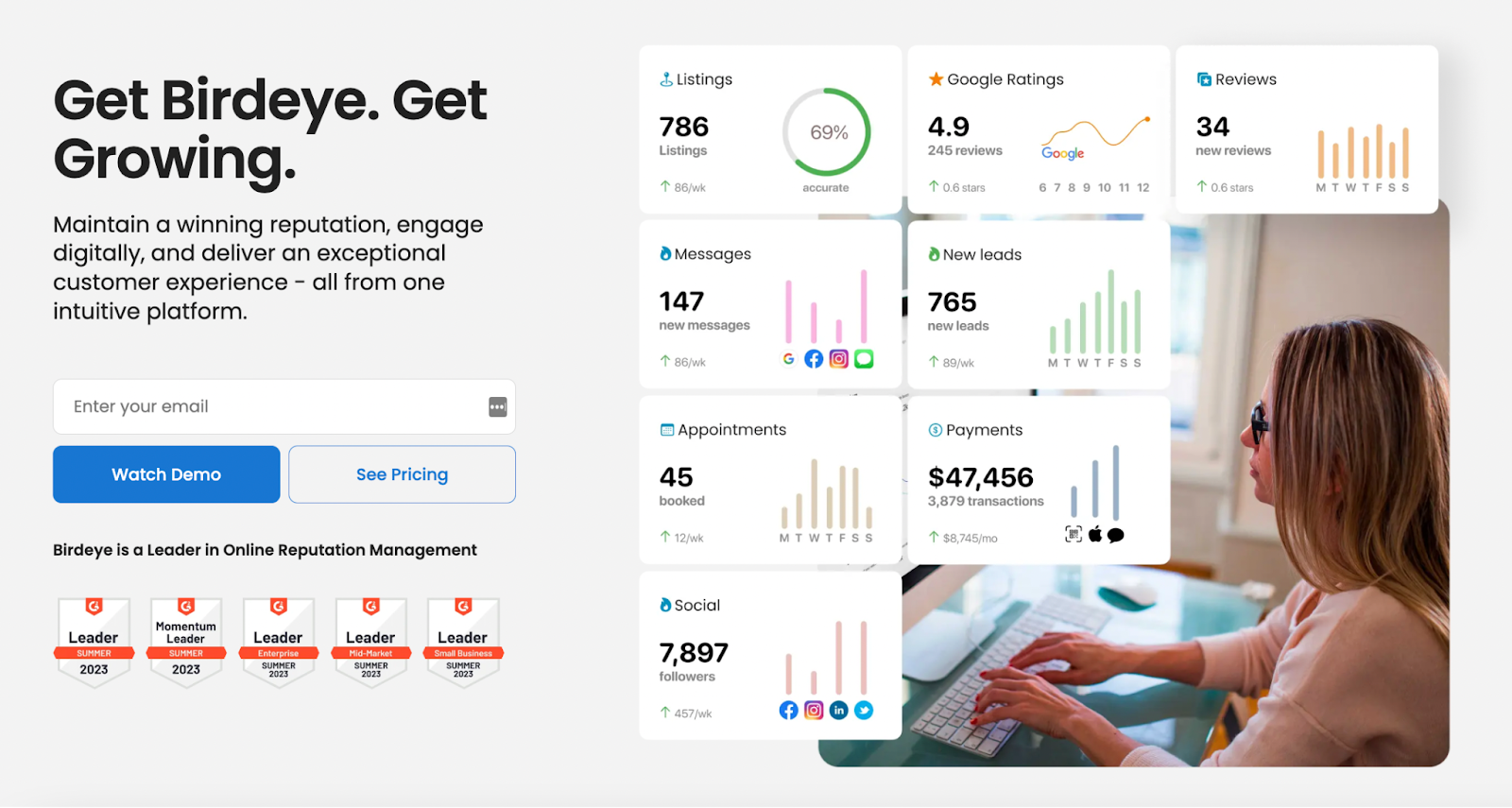
Key Features
- Simple listing scan: Scanning your business listings is simplified to a button’s click. This ensures you can quickly check how your business listings appear across different platforms.
- Unified dashboard: Manage and update your business listings from a single dashboard. This centralization saves time and reduces the complexity of managing multiple listings across different platforms.
- Automatic updates across the web: Updates in the dashboard will automatically reflect those changes across various web platforms. This ensures consistency and accuracy in your business listings throughout the web.
Cost: Starting at $299/mo per location
6. Chatmeter
Chatmeter is a service-focused solution that takes charge of managing and maintaining a business’s online listings. Their team of listing specialists ensures that a business’s information is always accurate and up-to-date across various online platforms.
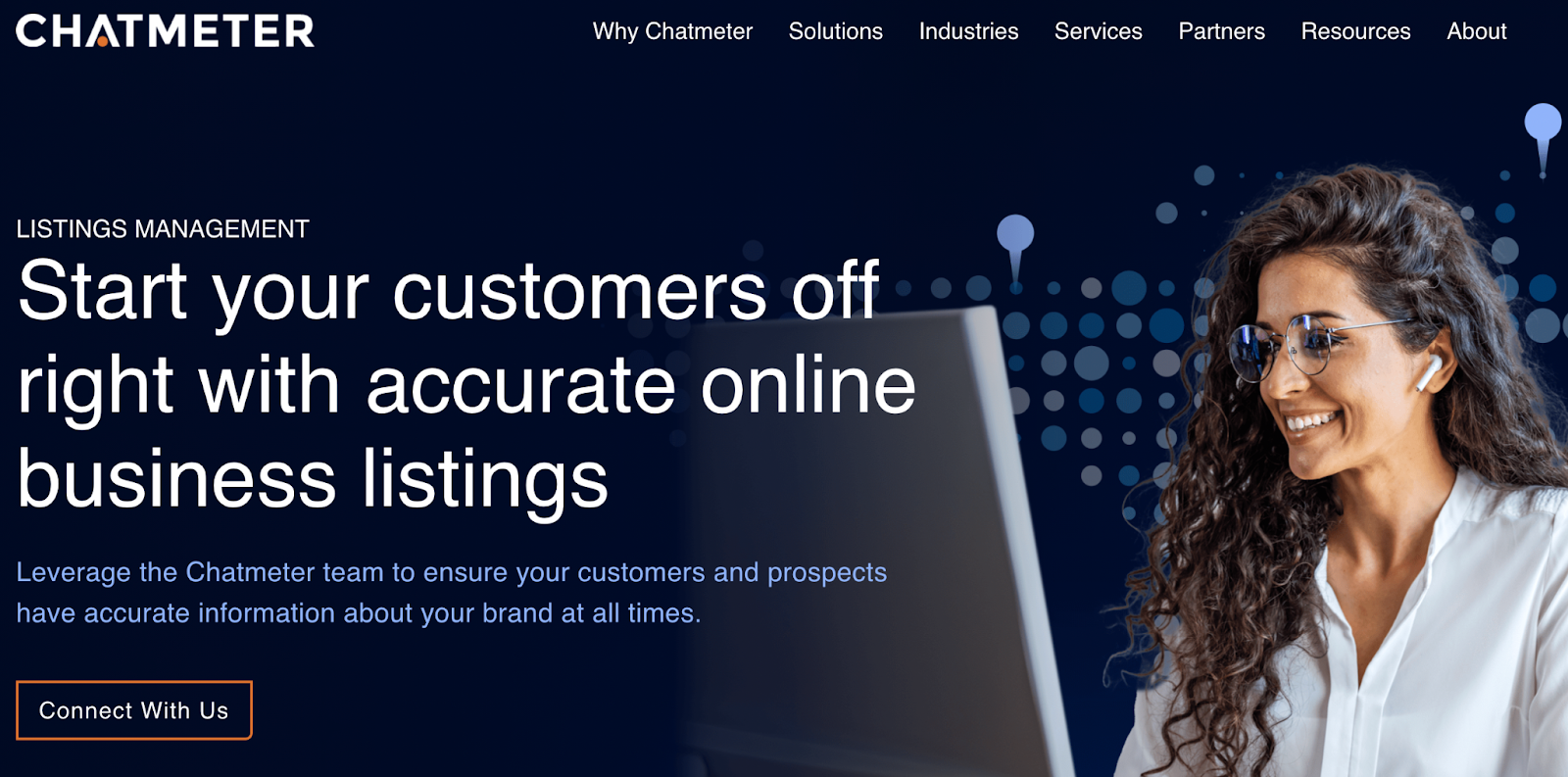
This outsourced listing management service allows businesses to focus on their core operations, while Chatmeter specialists handle the intricacies of online presence.
Key Features
- Accurate listing information: Ensures contact information, operating hours, categories, and photos are always accurate and up-to-date across various online listings.
- Customer engagement: Get listings managed by the Chatmeter team and ensure your business engages with customers effectively. Expert management helps in enhancing the customer experience and brand perception.
- Time-efficiency: The Chatmeter team takes over the task of managing and updating all listings, whether a business has 20 or 20,000 locations. This allows businesses to save time and focus on other crucial aspects of their operation.
Cost: Request a demo for pricing details
7. Localo (Surfer Local)
Localo (formerly known as Surfer Local) focuses on improving your online visibility with local SEO. This software aims to enhance your profile rankings and reach new customers with AI-powered tasks and tools.
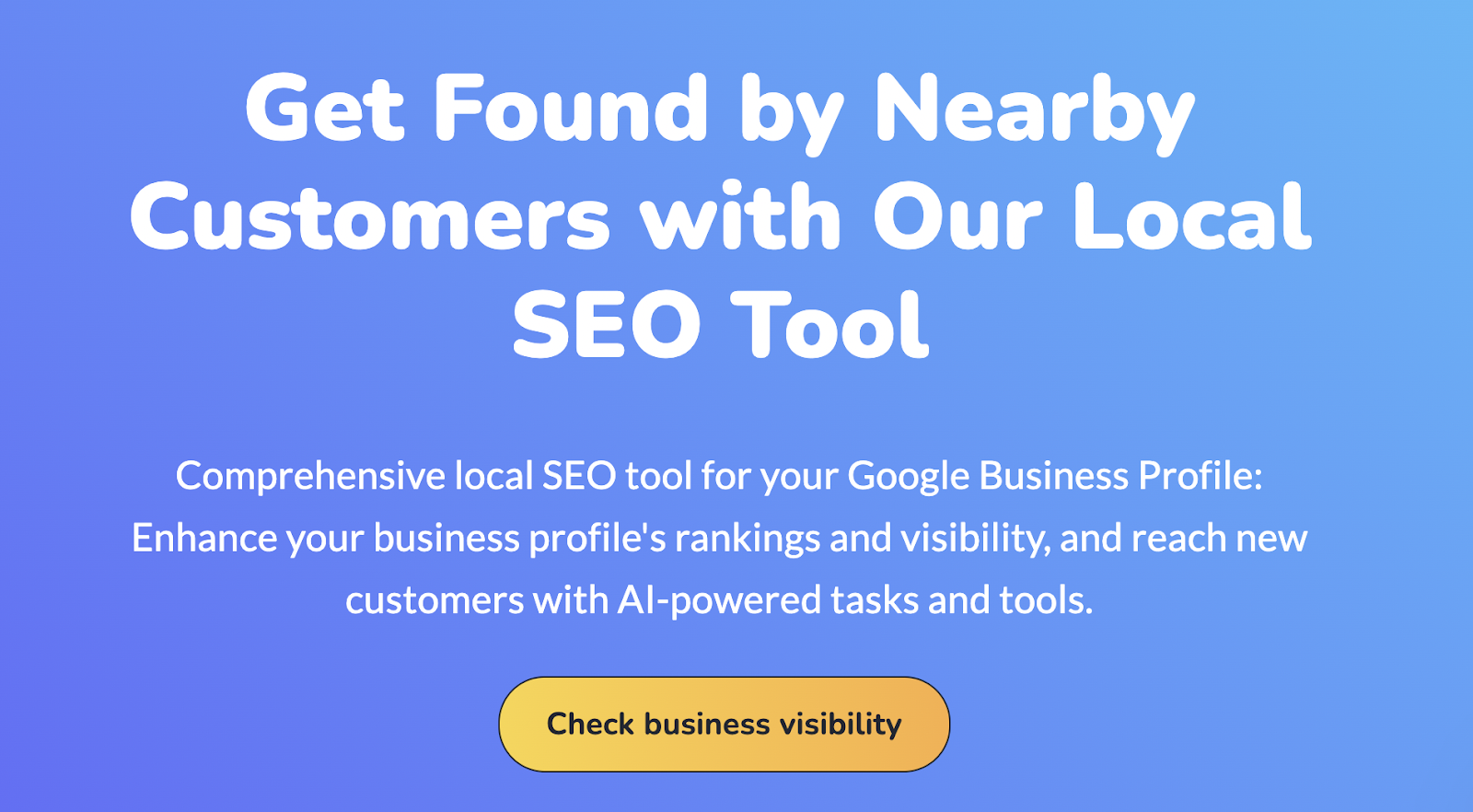
Key Features
- Google position checker: Allows you to check your company’s visibility on Google at multiple spots in your area. This helps ensure that your business has a strong presence in local search results.
- Optimization tips: Provides ready-to-implement optimization tips and audits that help improve your position on Google. It guides you on how to enhance your business profile for better visibility.
- Automated position monitoring: Offers automated position monitoring. You can select phrases to track your business’s position and receive handy reports directly in your email. This lets you react immediately to any changes.
Cost: The starting price is $9.99 per month per location. This basic plan covers essential listing needs. For more in-depth features, Localo has higher-tier plans. These plans provide comprehensive management and auditing tools.
8. LocalFX
LocalFX aims to be a straightforward solution. The software can help elevate your local SEO by enhancing your online presence through business listings and review management.
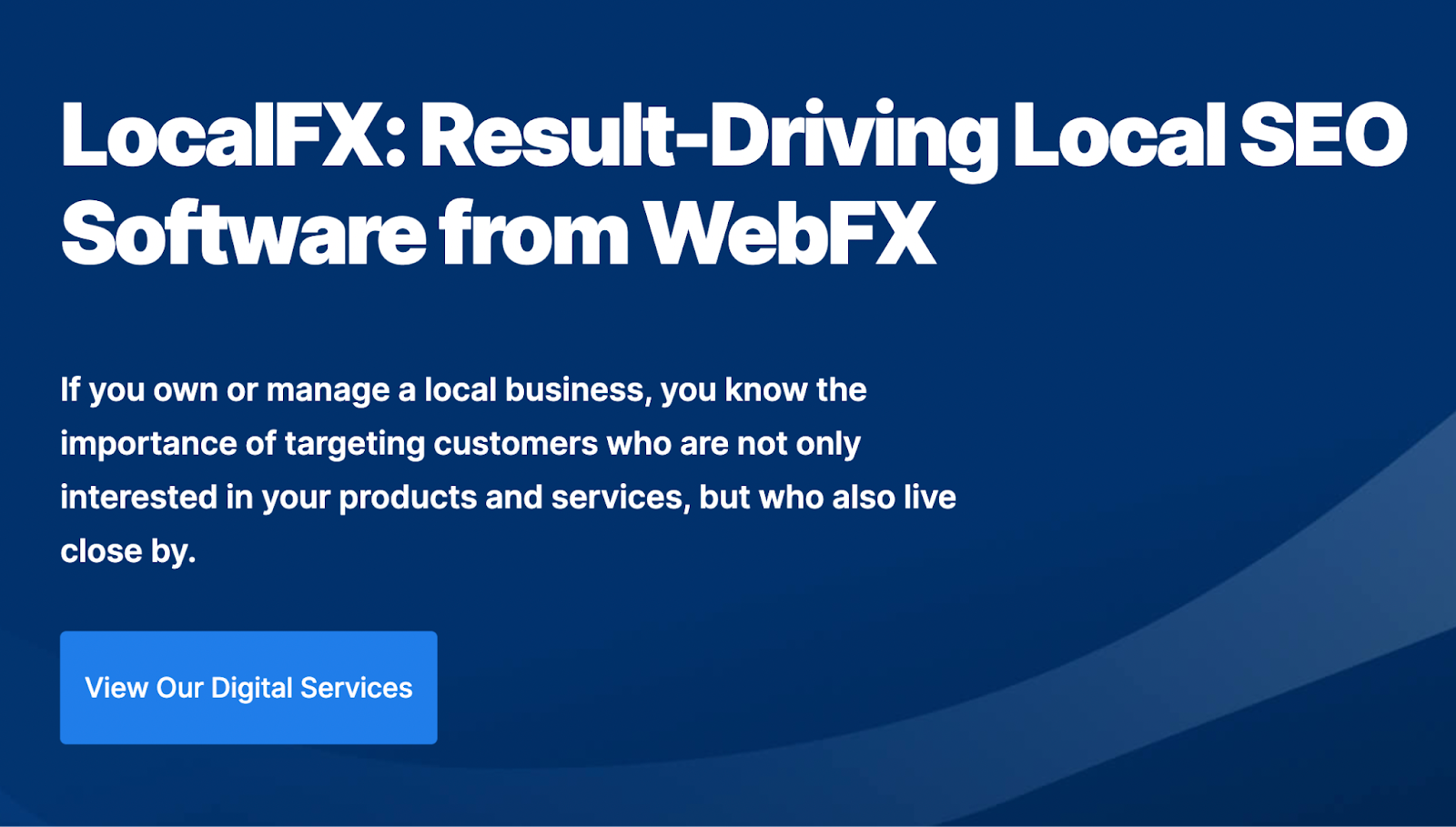
Local FX simplifies the complex processes involved in local listing management, like duplicate removal. This helps ensure your business information is not duplicated and causing confusion across various platforms.
Key Features
- Update and sync listings: Allows you to seamlessly update and synchronize your business listings across over 100 directories.
- View listing status: Track the status of your listings. The intuitive dashboard informs you whether a listing is active, duplicate, or incorrect. This can help you manage your online presence more effectively.
- Monitor reviews and social media: Monitor customer reviews and social media mentions in real-time. You’ll receive notifications, allowing you to respond promptly. You can also manage your business’s reputation and engage effectively with your customers.
Cost: Pricing varies based on the number of locations ($20-$50/mo). The more locations, the less the monthly cost. LocalFX does not list specifics.
Choosing the Right Local Listing Management Software
Selecting the ideal local listing management software is a key business move. It ensures your location information is uniform across the web. It also allows you to quickly address customer reviews and inquiries.
Here’s a quick step-by-step guide to making a well-informed choice:
- Features: Use this guide to compare different platforms to understand what each has to offer.
- Budget: Some platforms will offer a free trial before you buy. You can try a few before you commit.
- Scalable: If you plan on scaling your business, make sure the platform you choose can grow with you.
- Value: Check if the platform lets you pick and choose features. You don’t want to pay for something you don’t need or won’t use.
Key Benefits of Using a Listing Management Tool
There are four key reasons why businesses should consider a listing management tool:
- Enhanced online visibility: Improves the visibility of your business in local searches and search engine results.
- Centralized listing management: Helps manage business information conveniently from one place.
- Improved customer trust: Accurate and consistent business information fosters trust among customers, encouraging in-store visits.
- Monitor trends: Update your strategy to reflect changes in the industry and customer preferences or behavior.
Further reading: How to Add a Google Maps Business Listing: Step-by-Step
Let’s dive into the details.
Enhance Online Visibility
Many customers discover businesses through online directories and search engines. Often they search for “restaurants near me” or “fun things to do in X city”. Having a targeted and visible online presence is crucial for showing up in search results and engaging with these customers.
In the example below, the Semrush Listing Management tool alerts Nap’s Grill in Hamilton, Montana to several missed opportunities. Nap’s Grill can now go into their dashboard and fix these to improve and expand their coverage.
Further reading: The Essential List of Business Listings You Can’t Ignore
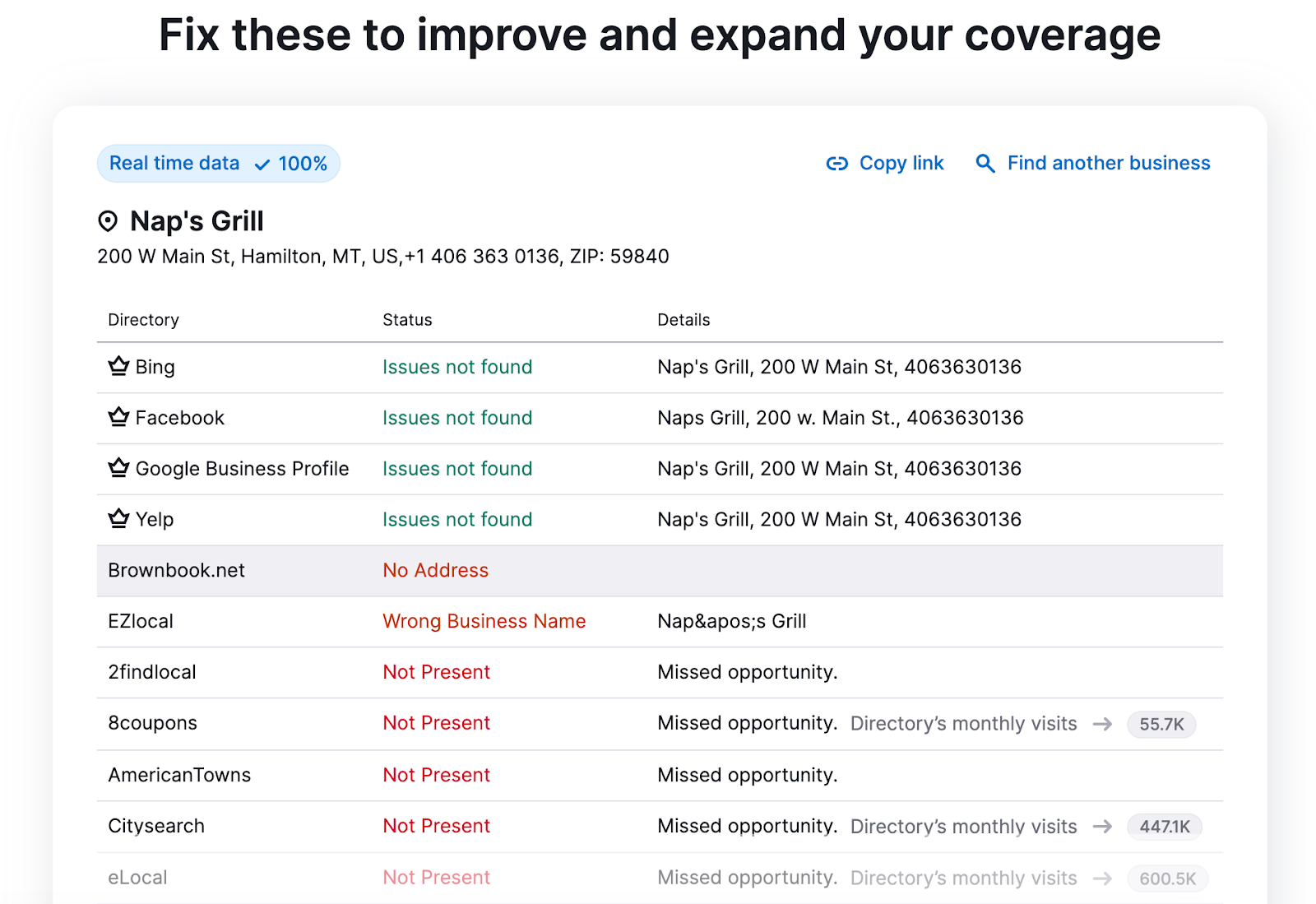
Centralize Listing Management
Management tools automate the updating process from one centralized location. Every time you make a small tweak, say to your hours of operation or your seasonal menu, your business listings are automatically updated across the web.
According to Google data, 4 in 5 consumers rely on search engines for finding information about local businesses. This means if your details are inaccurate, it could cause frustration for people trying to patronize your business.
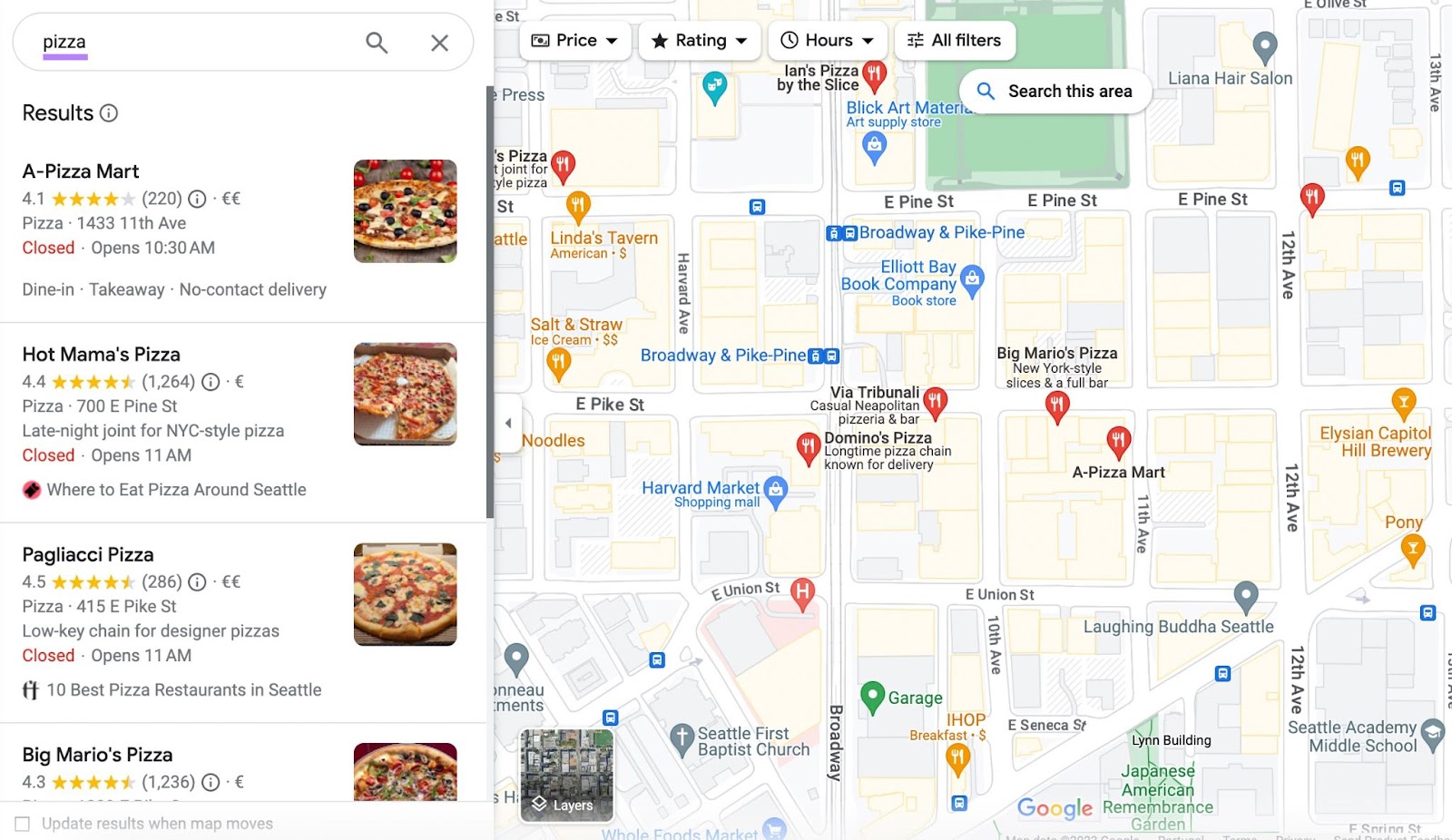
Improve Customer Trust
Building trust takes time—and it can be destroyed almost instantly. A broken website link, incorrect hours of operation, or an unanswered question can immediately derail potential customers.
With the help of a listing management tool, you can ensure you’ll never miss an opportunity to improve trust and build confidence in your brand. You can set up alerts to know when a potential customer asks a question online. This allows for a swift and informative reply. You can even consolidate all questions into one place to help you or your sales team convert customer inquiries into actual visits.
Listing management tools are also key for managing online reviews. With 98% of customers reading online reviews for local businesses, it doesn’t take much for a negative experience to stand out. Your response strategy serves as a critical touchpoint in customer decision-making.
In the example below, the Semrush Listing Management tool alerts Ceaser’s Palace in Las Vegas that it has a few public reviews it needs to address.
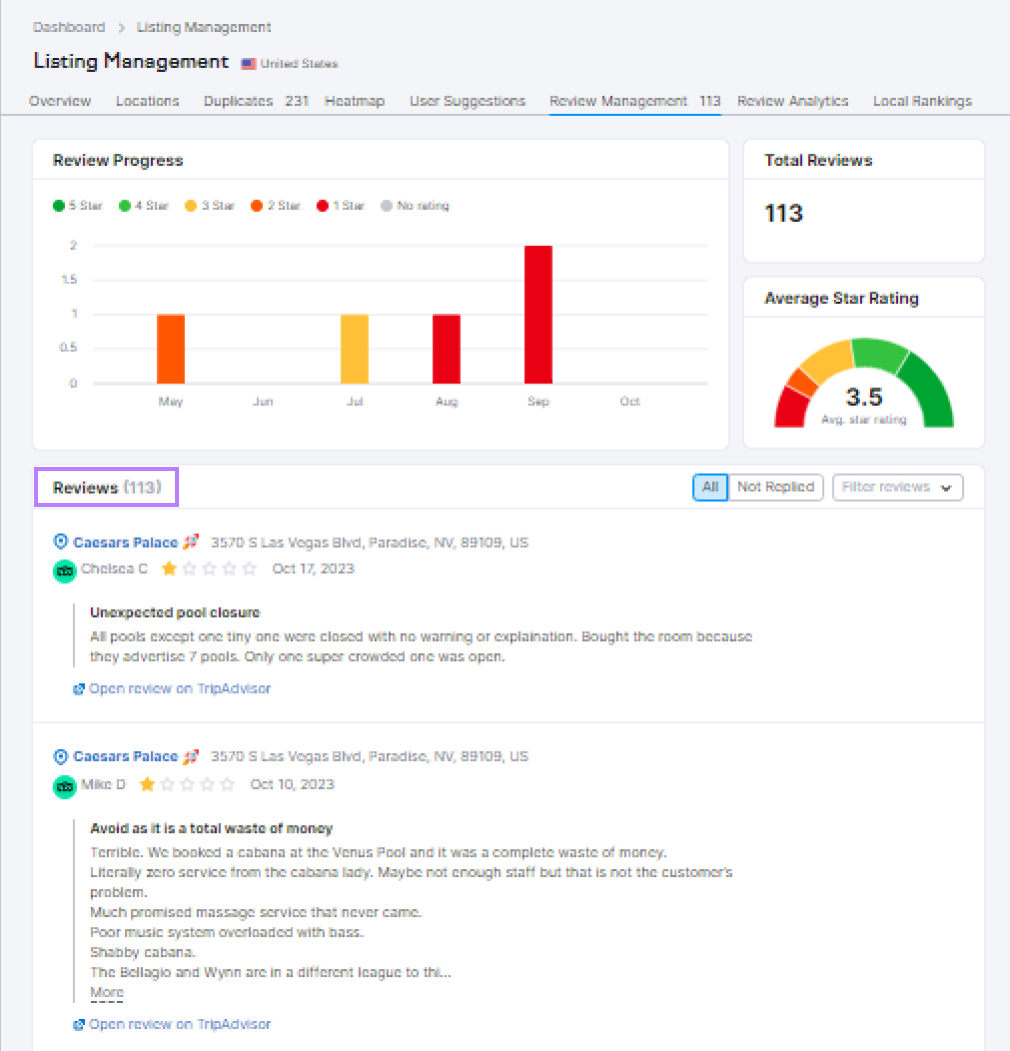
Monitor Your Competitors
You can use a listing management tool to understand your competitor’s behavior and strategy. Keeping tabs on what people are saying about your competitors provides a wealth of information that can inform your decision-making processes and enhance your competitive advantage.
A listing management tool like Semrush can help you monitor feedback given to your competitors. This data can provide insights into the features, pricing, and customer service aspects that are important to your target audience. It can help you understand customer pain points with competitors and can guide you in developing solutions that address those specific issues.
In the example below, you can see how the reviews from an Oklahoma Starbucks stack up to its local competitors.
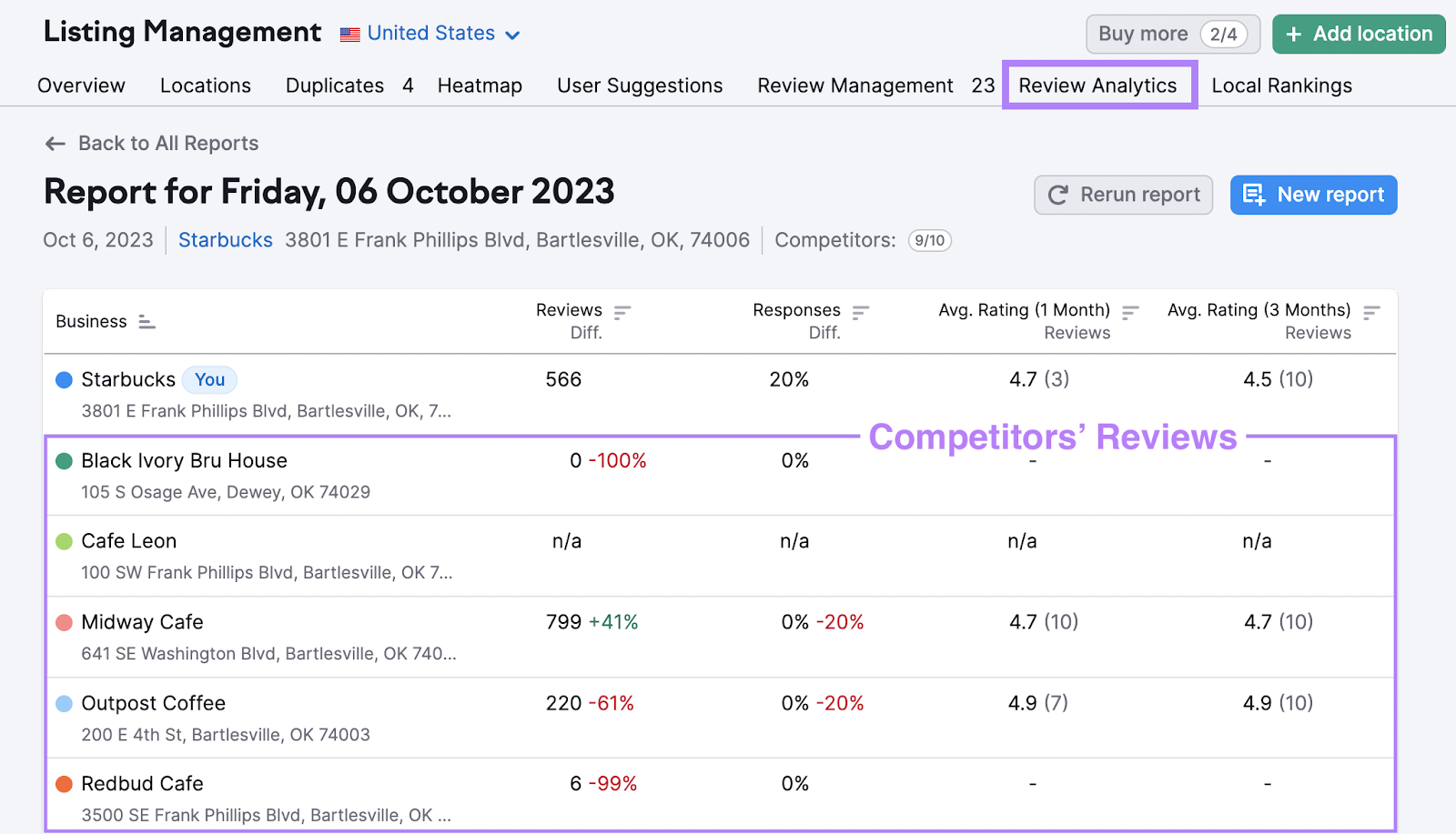
Further down in the report, you’ll see a “Competitor Average” rating, a summary of the ratings.
The report also displays any relevant reviews that need to be addressed.
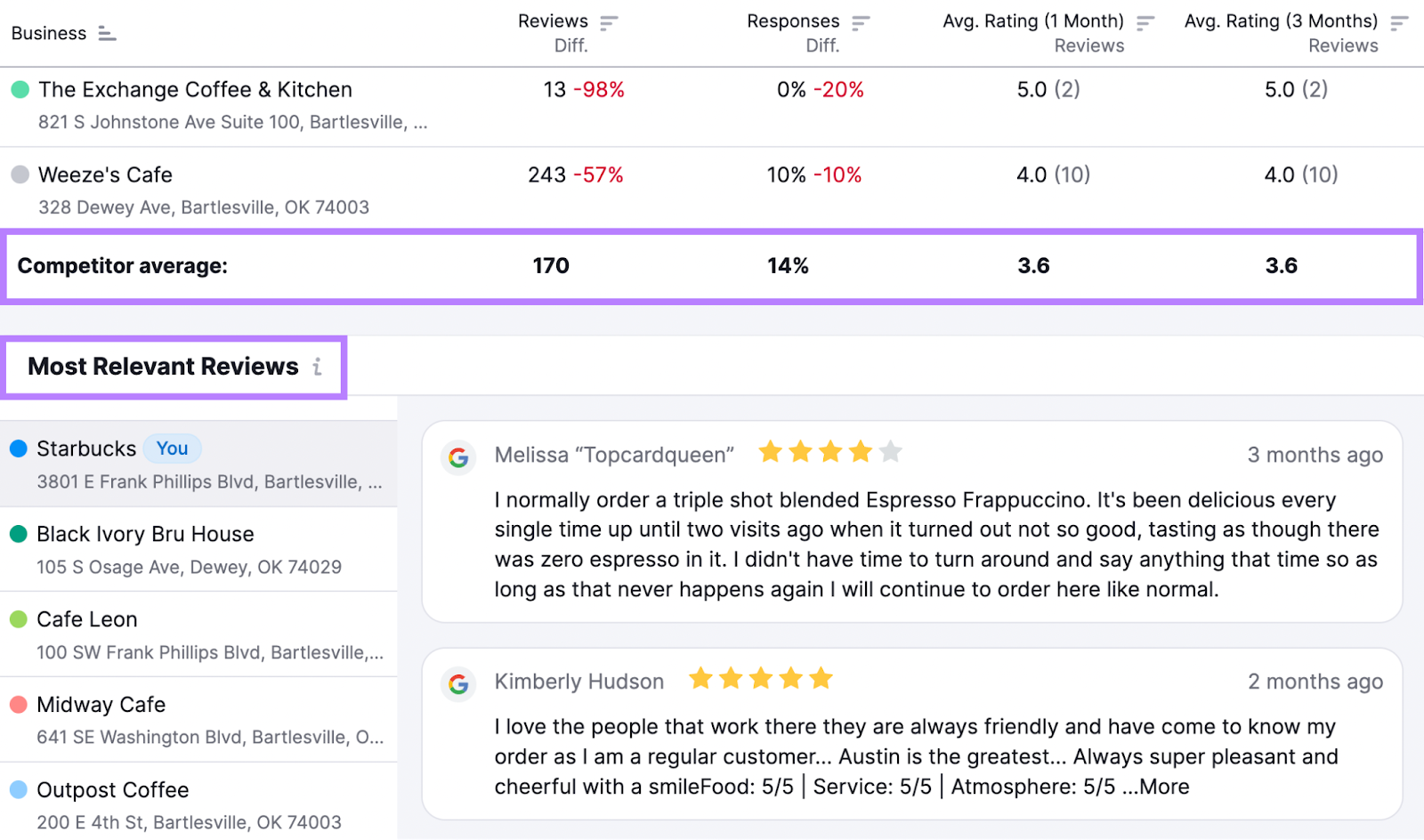
FAQs about Local Business Listings
What Is a Local Business Listing?
A local business listing is an online profile that contains essential information about a business, such as its name, address, phone number, business hours, website, and a brief description. These listings are typically found on online platforms, directories, and search engines, helping customers find local businesses more easily.
How Do I Create or Update My Local Business Listing?
The process of creating or updating a local business listing can vary depending on the platform. Businesses can generally claim their listings on platforms like Google, Yelp, or other industry-specific directories. Verification is often required to ensure the accuracy of the information. Once claimed, businesses can update details, add photos, respond to customer reviews, and manage other aspects of their online presence.
Why Is It Important To Have Accurate Local Business Listings?
Accurate local business listings enhance a business’s visibility online, making it easier for potential customers to find and contact them. Accurate listings contribute to a positive user experience by providing up-to-date and reliable information. Additionally, search engines consider consistent and precise business information as a ranking factor, influencing the business’s online presence and SEO.
What Are the Benefits of Optimizing Local Business Listings?
Optimizing local business listings increases visibility in local search results, improves online reputation through customer reviews, and enhances credibility. Businesses with optimized listings are more likely to attract local customers actively searching for products or services. Moreover, local business listings contribute to a consistent and professional online presence, essential for building trust with potential customers.
An End-To-End Solution for Listing Management
Take control of your online presence and boost your local business visibility with the help of the Listing Management tool from Semrush.
Experience the power of a single, comprehensive solution for efficient listing management and local SEO. Don’t miss out on potential customers and ensure your business stands out in local searches. Try Semrush for free today!
